Text
I've come to the conclusion recently that eloquent and sophisticated essays providing apologia for Rin/Shirou are pointless. It scarcely matters how compelling and articulate the argumentation is, or how well the passages adduced bolster the central thrust of the lucubration, if someone simply didn't initially understand Rin, they never will. Not really. I have lost track of how many times I have managed to "sway" someone around to appreciating Rin and the UBW romance more, with their proving themselves to be perfunctorily adroit at regurgitating my own prolix ramblings, and even rhetorically gifted at insufflating their own essays with impressive rhetorical flourish and ornate, evocative imagery, only for them to subsequently demonstrate themselves as congenitally incapable of truly applying what they had learned (through rote memorization) to reach deeper insights about the character on their own. If I didn't hold their hand like a fucking baby and condescended to them, they would never realize their errors.
Rin/Shirou is something that you simply intuitively understand, or you don't. You can certainly produce analyses, but you should never do so with the expectation that that is going to truly convince anyone. I certainly don't think the romance was a particularly abstruse and opaque part of the story, but for some reason it does appear that one needs access to mystical arcane means to comprehend it. But really, what's the point of deservedly singing the praises of Your distortion if you're going to spew bullshit like Rin was adapted well in the HF films (remember, it doesn't matter how much you explain to someone the nuances of Rin's character in HF and how her relationship with Shirou is crucial to groking her out, they'll still see her as nothing more than a support pillow for Sakura (the sisters storyline really was a mistake), and Rin is nothing but that in the HF films, so it works out for them right) or just spew factually incorrect, easily disprovable nonsense like "Shirou doesn't stay with Rin or settle down to have a family with her in UBW" (could the UBW ending poem and anime finale be more explicit, you morons?)...?
And this admittedly enough doesn't apply simply to Rin. I am perfectly willing to admit that I myself have many blindspots and there are many characters that I appreciate on a technical level but cannot confidently say I meaningfully comprehend (not just in FSN, but in general). The difference would ultimately be however that I simply don't discuss those subjects and characters. But some feel compelled to pontificate at length about Rin and spread contumely against her, whether intentionally or unintentionally. Just please shut the fuck up and don't discuss her at all if you're too obtuse to get it.
Anyway, I intend to write something on the underappreciated aspects of Rin and Archer's character dynamic, and its role in UBW. Been planning it for months, but things kept coming up.
2 notes
·
View notes
Text
An Analysis of Two Different (Yet Complementary) Endings: UBW in the VN and the Anime; and What They Mean
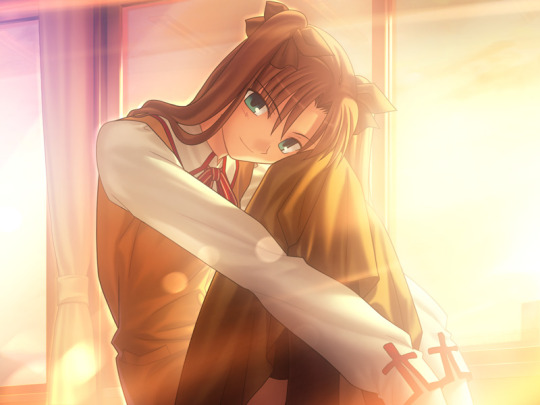
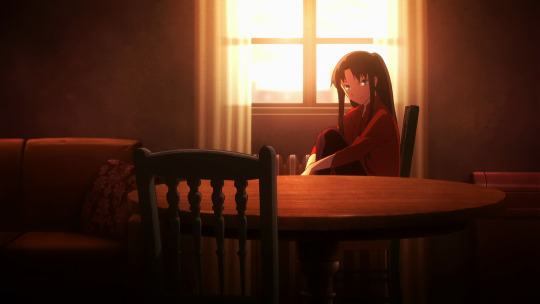
So I recently finished my re-watch of Ufotable’s unjustly maligned 2014-15 adaptation of Fate/stay night’s Unlimited Blade Works route; I thoroughly enjoyed myself, which wasn’t shocking at all—Rin/Shirou is only my favourite fictional relationship (not just romantic, but any kind of relationship). It did however induce to more thoroughly and exhaustively compare the anime original conclusion to the two’s story with the original ending as presented in the VN, if only because I suspect that a careful reading of the nuances of the characterization of both will yield some very fruitful results. It might seem a bit paradoxical at first, but I’ve come to find these two scenes while seen incredibly fondly by most Shirin shippers are in fact quite underappreciated—because there’s just so brilliant and intricate in the subtle ways in which they manage to weave in so much depth and substance into exceedingly simple and seemingly plain plot developments. They are insanely thematically rich, and people often are left far too dazzled and enchanted by the magic of the superficial writing that they miss the genius hidden beneath the surface.
We’ll start off with the comparatively simpler part of the analysis: the original conclusion to Rin and Shirou’s story.
The Ending in the VN
For the purposes of this analysis, I will be skipping all of the epilogue sans the final classroom scene; the reasoning is quite straightforward and should be readily obvious—most of what is of relevance to this analysis is basically confined solely to Rin and Shirou’s final conversation. This disclaimer might appear to be superfluous to some, but I decided to include solely due to my recognizing an asymmetry in the structure that I chose to employ herein—because the section posterior to this one will have to deal with comprehensively picking apart the entirety of episode 25 of the anime. There was a distinct possibility some readers might find the decision somewhat puzzling, so I think it would be no great harm to tell people what precisely they are getting into, though I consider the content itself will be perfectly sufficient in providing people with an understanding of the thought process behind it. So without further ado, let’s finally begin.
The crux of the conversation between Rin and Shirou that caps off UBW is her invitation to him to tag along with her to London as she goes to continue her training in becoming a proper magus—and Shirou’s reaction to her doing so. I will now post all of Shirou’s key internal monologues relating to the matter during his initial contemplation of the matter, omitting all of Rin’s elaborative comment interspersed throughout Shirou’s thoughts for comedic effect, in order to allow us to better understand what precisely the story is trying to communicate here.
She speaks casually, but I'm sure it's an amazing thing.
…But London, huh? …That's certainly too far away.
My father wasn't in the Magic Association. I'm just like him, and I don't like formal stuff.
[...]
…But I might be able to move there.
I can start working more, study English, save up traveling and living expenses, and find a job over there…
[...]
No, no, let's say I am able to rent an apartment there.
I don't know what kind of a place the Clock Tower is, but I'm sure Tohsaka will get even busier. …Then it should be better for me to go there after I become a proper magus by myself.
Yeah, that sounds good.
First of all, London isn't suited for me. I bet I'll faint if I go there and if it's filled with people like Kotomine———
It is at this point that Rin finally notices Shirou has wandered off in his thoughts and thus not paying attention to her—subsequently presenting what amounts to an ultimatum to him. But before we go into that, let us more carefully and studiously parse what we have been presented with here: a dialectic. A dialectic meant to represent Shirou’s inner conflict—an exceedingly minor and trifling conflict, no doubt!—between his ideological aversion and distaste for formal magecraft and the sorts of individuals drawn to it, and his curious desire to nonetheless follow Rin wherever she goes. For literary effect, the text chooses not to immediately explicitly reveal what might be behind this willingness to nonetheless move to London despite his misgiving, but anyone who has been paying even the tiniest bit of attention can easily deduce what might be the cause. Nevertheless, the story firmly establishes a key piece of information going forward—Shirou is not fond of the Mage’s Association. He would certainly not choose to associate himself with them of his own volition.
But now that we have the set-up, we are almost immediately greeted with the pay-off—the previously posted CG of Rin’s brilliant visage in an adorable hunched over position and adorned with a radiant, loving smile, accompanied by the following text:
"So, what will you do, Shirou?"
She asks me gently, with eyes that see through me.
"——————"
My face turns red.
Her words and expression blow away my humility and my dislike of the Magic Association.
…This is what I mean by Tohsaka holding my weakness.
I can't help it if I fell in love with her.
“Oh, why go silent now? I haven’t heard your answer yet.“
She keeps smiling mischievously.
She knows what my answer is, but she's mercilessly attacking me.
"Uh… I, um…"
To be honest, London is too far away, but I can't imagine myself being taught by anyone other than Tohsaka.
And I never even thought about parting with her.
Most of all, I want to be with Tohsaka.
"Be clear, this is important.
Will you still come with me, even if it's as my assistant?"
She looks up into my eyes.
She looks so attractive that I feel like my heart will pop out of my mouth.
"S-Shut up, you idiot…! You idiot, idiot, idiot! I-I-If it's so important, tell me about it in a more appropriate place! I can't answer you when it's so sudden…!!!"
I don’t know what’ll happen to me if I keep staring at her, so I look away. ...I still feel Tohsaka’s presence.
She’s happily watching my reaction.
"Hey, Shirou. What's your answer?"
She murmurs gently.
………She's got me beat.
Is it this hard to nod and reply honestly?
"………"
But I can't turn around unless I say it to her.
"……You idiot. Don't ask me such an obvious question."
I meet Tohsaka's gaze and tell her my honest opinion.
Her smile broadens at those words.
“And I never even thought about parting with her. Most of all, I want to be with Tohsaka.” That’s the key portion here. The internal tug of war between Shirou’s deep-seated hatred for the common amoral magi and the stifling environment of Clock Tower on the one hand, and his unbridled love for and admiration of Rin is decisively and unquestionably resolved in Rin’s favour. It was barely even a contest. Returning to previously discussed dialectic, it is noteworthy how Shirou considers moving to London at a later time than Rin so that he wouldn’t represent a burden for a Rin less likely to be able to spend precious time with him. Hell—the guy already starts making plans about how he’s going to move there without her even inviting him or expressing that she wants him to go with her! He’s so lovestruck that the mere mention of her moving to London has his immediately making preparations so that he can be with her. It’s odd to think that Shirou could possibly find some way to work more than he already does, but that’s not stopping him. Shirou’s internal back and forth weighing his options, contrasting his reservations towards moving to London with his obvious preparedness to go there for Rin’s sake, is presented as barely even really being a proper conflict; the outcome was determined from the very start. There was simply no other way this could have been resolved—Shirou wants to be with his Tohsaka.
But why is this the conclusion to UBW? Why precisely was it so important to finish the route like this, with this particular scenario, with this particular character dynamic? It might seem like this is just the logical conclusion to how the story should be: it’s hardly in-character for Rin, someone who is portrayed as someone who loves magecraft and finds it fun, to not eventually go to Clock Tower, given that one of the themes of the route is her and Shirou’s learning to walk their chosen path out of their own love for it and on their own terms; it also helps reaffirm Shirou’s love for her. But how exactly does this help cap off Shirou’s character arc? How does this serve as a fitting conclusion to his character arc taken in its entirety, including his conflict with Archer? The essential element here is Shirou’s invocation of Kiritsugu, prefacing the rest of his comments elaborating on his opposition to the Association; Shirou’s refusal to move to London is symbolically associated with his ideal. The core question of UBW of course is “Will or will not Shirou become just like Archer?” He is after all walking on the same path, headed to the same direction. What makes him so different? This scene is meant to answer that: his love for Rin. The entire scenario is a microcosm of Rin and Shirou’s relationship, showing why he won’t become Archer: he loves Rin more than he wants to pursue his ideal. Of course Shirou wants to become a superhero—but he wants to be with Rin even more. Shirou will always treasure the precious time he spends with Rin far more than he does his adventuring. Whatever corner of the world he may be in, whatever conflict is afoot, no matter how faraway he may be—he will always find his way back home, the place where he truly belongs: with Rin. The girl who loves him, and whom he loves back.
And I really cannot think of a more fitting poem to end that scene than...

The Ending in the Anime
In episode 25 of the 2014 UBW TV anime adaptation by Ufotable, we finally get to see Rin and Shirou’s life together in London.
It makes for incredible fanservice, to say the least.
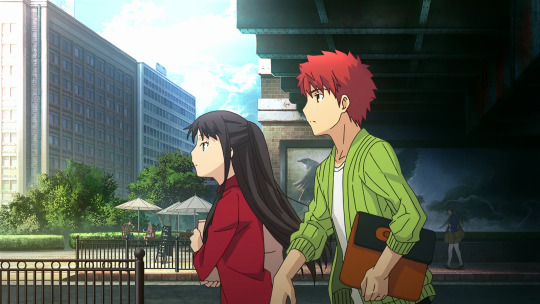
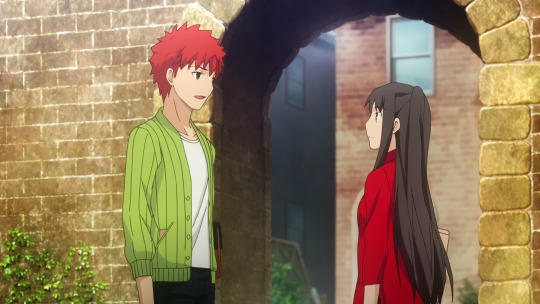


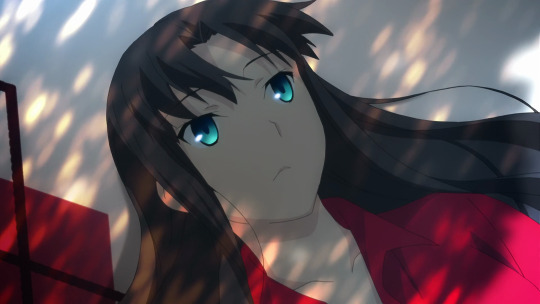
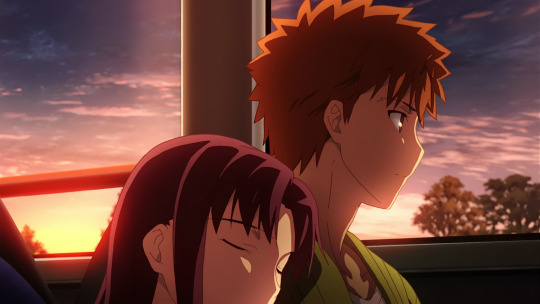
He’s giving her a headpat—SHE’S SLEEPING ON HIS SHOULDER!!! Thanks for humouring my pic dump; now, onto the analysis.
Within the confines of the anime, the classroom conversation between Rin and Shirou is quite heavily abridged, positioned very deliberately so that it may be carefully instrumentalized for the specific narrative purposes of the broader narrative of the London epilogue it is situated in. It is in short repurposed. We will have to return to the specifics of that later. For now, let’s begin analyzing how the narrative unfolds.
The epilogue has a three act structure, divided over three in-universe days. The first day acts as the set-up; the second day as the elaboration; and the final day provides us with the conclusion. Now, the first day is mostly fanservice, and this is not without reason: while it lays the foundation for Shirou’s inner conflict that we see unfold over the next two days, it is a mostly laidback story that simply invites us to enjoy Rin and Shirou’s nearly idyllic life in London. It’s a way to frontload almost all of the pure, unadulterated fanservice so as to allow for more narratively relevant elements to be positioned at the very end, which is precision-focused to delivering a fitting conclusion to Emiya Shirou’s arc—which isn’t to say that the latter portions of the story lack fanservice, or that the frontloaded fanservice has no purpose whatsoever; rather, the later fanservice simply has more thematic depth to it. The early fanservice meanwhile serves mostly to establish what Rin and Shirou’s life in London is like; it’s purpose is to establish what is at stake. Many have lamented that Ufotable cut a lot of the elements which were included in Nasu’s original script (most likely rejected due to the Ufotable animation staff’s qualms with having to do another exhausting 45 min episode), but ultimately it was for the better in my estimation; it resulted in far more focus. Instead of wasting time on the total mediocrity of a character that is Luvia, the existing story utilizes her wisely for a specific purpose—to establish just how much Rin has changed over the narrative. I mean, the girl went from freaking out at the suggestion she might be fond of a certain redhead to being so openly enamoured with him that’s she willing to throw down with other girls for flirting with him! The idealized portrayal of Shirou’s new idealized life with the girl he loves is interspersed with discussion of his receiving an invitation to join the Association—and the implications of that. The day ends with Shirou’s mentioning that his heart lies elsewhere; in his pursuit of the ideal.
The next day is fairly laidback as well, but also a bit more... contemplative. Rin and Shirou’s ruminations on the Holy Grail War and what they learned from it during their visit to Glastonbury aren’t exactly directly connected to the central conflict of the narrative, but they nevertheless help portray just how much more mature these characters have gotten, how much they have changed since the events of HGW. It’s important to have Rin portrayed in a much more serious light; after all, the beginning of the episode had her used as comedic relief. Yes, it’s a perfectly fine way to establish just how much Rin truly loves Shirou, but the conclusion to the episode ultimately relies on her being both loving and mature; she’s always been the more intelligent, level-headed and wise of the two, so it stands to reason that it would be quite prudent remind the audience of that as it becomes important once again. Once more, we are treated to a dialectic; the hopelessly in love Rin of the first day meets her antithesis in the wise, contemplative Rin of the second day, ultimately resulting in the synthesis we encounter in the final resolution to the narrative. Having Rin portrayed as being both more mature yet also more fun than Shirou also reinforces just how much more at ease she is at Clock Tower than he is.
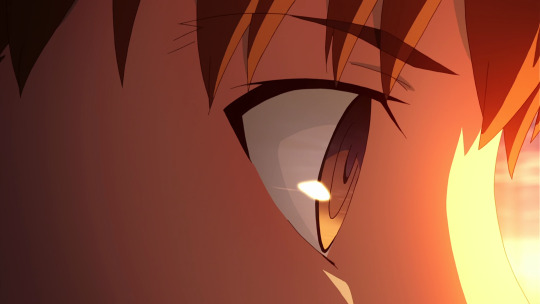
On the ride back home, Shirou has a flashback. And we suddenly find ourselves back in Fuyuki, two years prior.
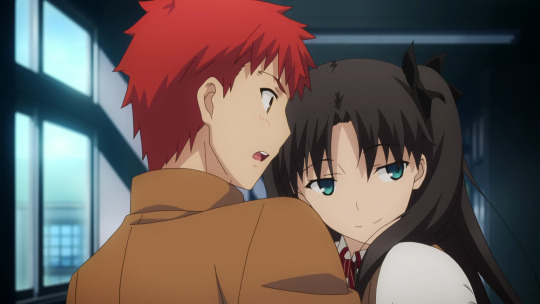
Cute.
Anyway, we return to our repurposed classroom scene.
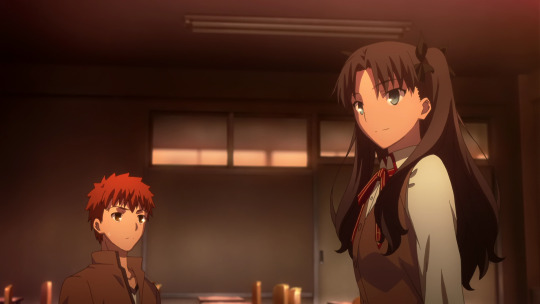
What exactly is the goal of this scene? Shirou’s monologues, so crucial to the scene in the VN, are wholly excised. We can see Shirou’s blushing like crazy (I can’t blame him...), but we are otherwise left clueless as to his considerations whether or not to follow Rin to London. The thematic relevance of the scene in the VN is gone; no-one, going based solely on the anime, could possibly have realized that this particular scene was meant to be a microcosm of their relationship, showing my Shirou will not become Archer. If anything, it wouldn’t be too much of a stretch to say that the scene is just there to fill in the gaps about what happened in the immediate aftermath of the events of Fifth HGW and act as more Rin/Shirou fanservice. It’s the final episode, so why not just give your audience diabetes ten times over? Just look at it!
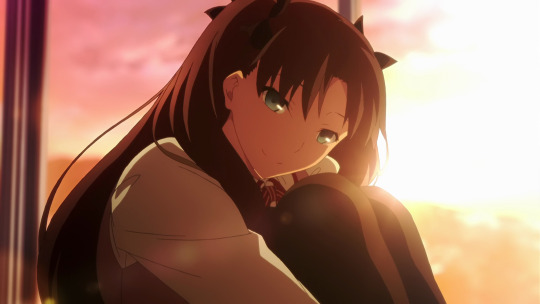
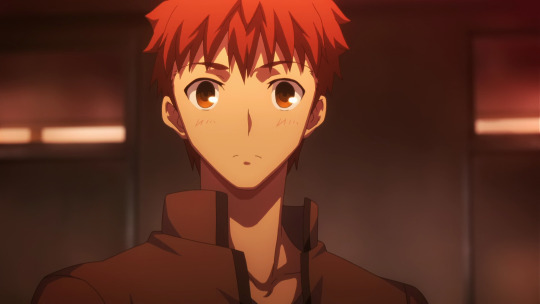
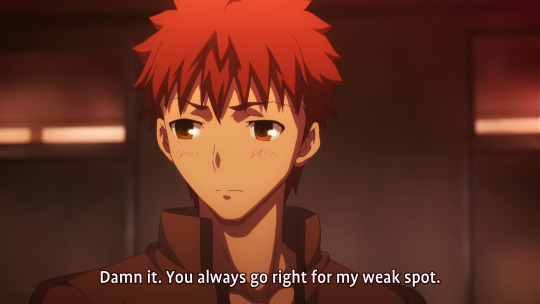
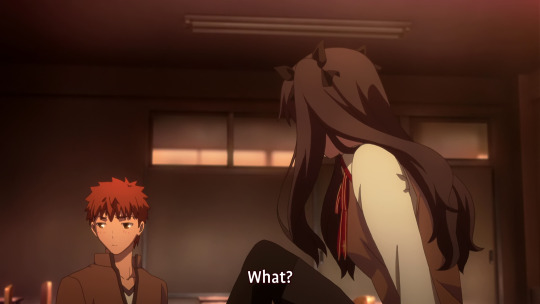
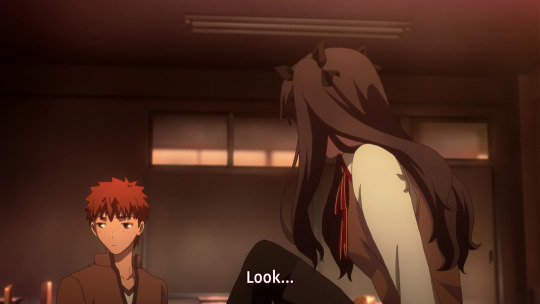

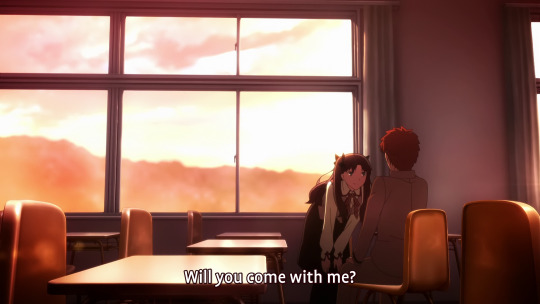
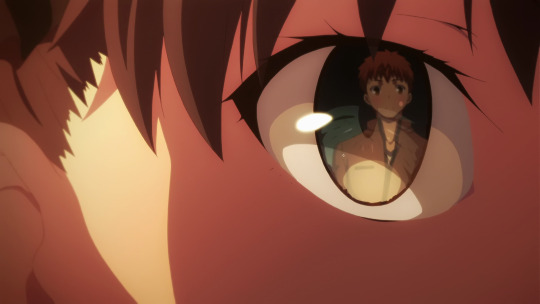

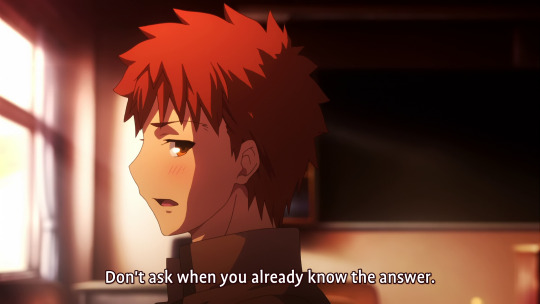

God, I’m really sorry if this many images bothers anyone—but I just can’t help it, it’s too cute and amazing.
But yeah... good fanservice. Doesn’t necessarily mean there’s anything thematically relevant or important to the characterization our heroes receive, right?
Well...
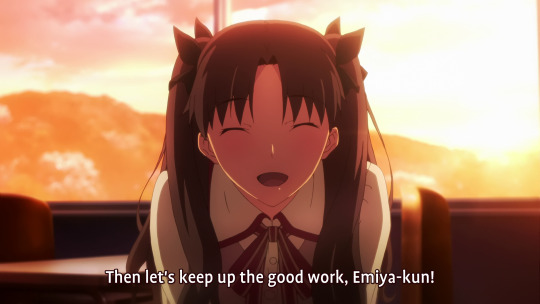
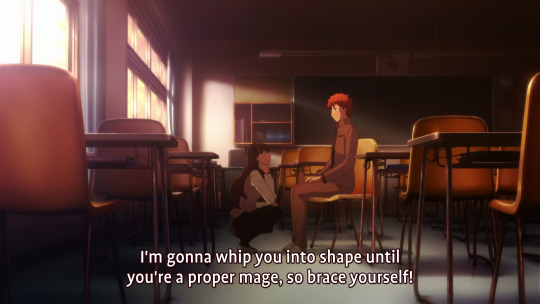
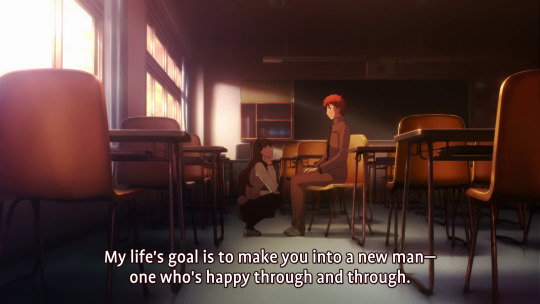
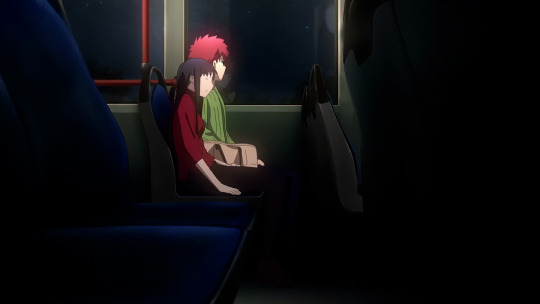


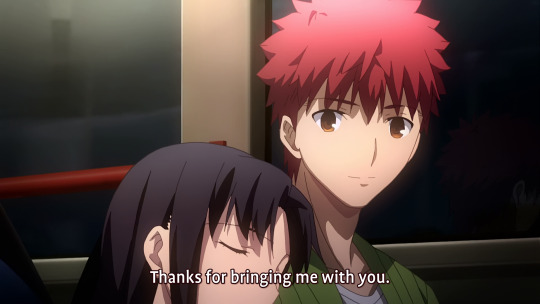
This... is what the episode is all about.
Shirou doesn’t want to betray Rin.
“Thanks for bringing me with you.“ Shirou is profoundly grateful to Rin for giving him this wonderful opportunity to be with her and spend time with her. He is so very happy to be able to cherish his time with the girl that he loves... but he can’t stay at Clock Tower. Rin is the only reason that he is happy there. He feels uncomfortable with the subject of his future there, too afraid to openly and honestly express his feelings to Rin, because he doesn’t want to break her heart. For all that Shirou has matured, he is still just a young man trying to find his place in the world, confused and scared; scared that he might have to abandon the girl he loves so dearly—scared of what she might say. He doesn’t want to spit all over her effort and hard work, all that she has ever done for him; fundamentally, Shirou’s conflict in this episode is about Rin. It’s about his struggling with the difficulties of maintaining the relationship that he has built with her, and his fears that it might not last. His fears that Rin wouldn’t understand what he’s going through, and reject him for it. And that in doing so... his fate will as Archer will be sealed.
But that’s not what happens. When he is finally forced to explain himself to her, he is surprised to hear that she isn’t mad at all. No, she’s wholly supportive of him! Encouraging, even! In fact... she’s the one reassuring him. Earlier in the narrative, Rin was Shirou’s foil as the down to the earth realist to his wide-eyed, idealism. Rin was the one with the self-esteem issues; Shirou was the one who kept charging at the impossible without a doubt in his mind about his chances of success. The confession was all about Shirou’s providing Rin with the necessary support to get back up due to his holding her in a higher regard than she did herself; to Shirou, she was always the amazing, incredible girl who never quits despite all the things weighing on her back. And now, in a beautiful symmetry... it’s her, the girl who didn’t think she had it in her to strive for the impossible, giving encouragement to him, the boy who never did quit, who now has doubts about his future... to never quit. Because she believes in him, just like he believed in her.
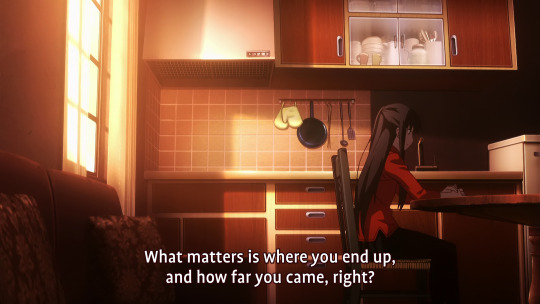



People tend to grievously misunderstand what Rin says in this episode—it’s responsible for like 90% of the stupid takes on this episode and the future of the Rin/Shirou pair. She never claims that she will always follow Shirou around; she quite openly states that she eventually wishes to settle down at Clock Tower, because pursuing magecraft is fun, it’s her dream, and it makes her happy. She just doesn’t think that is necessarily incompatible with her being with Shirou. Just like Shirou had made a temporary sacrifice coming to London to spend time with her, so too will Rin now make a slight detour from her path to accomplishing her dream to support the most precious person in her life. It’s why I find it somewhat regrettable that Shirou’s monologues were removed from the classroom scene; it would have been nice to have it be readily apparent within the show itself without recourse to the VN that there’s a symmetry between Shirou’s going to London with Rin and Rin’s going on adventures with Shirou. I understand the omission, given the excellent execution, but it was nonetheless an imperfection solution; perhaps the only one there was. But I can still lament, can’t I?
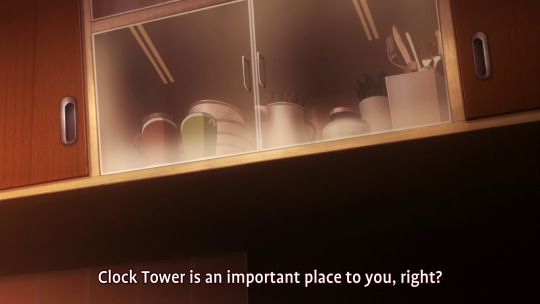

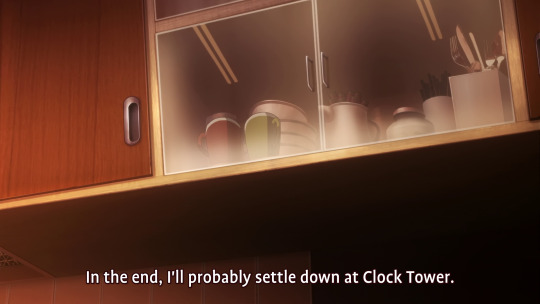
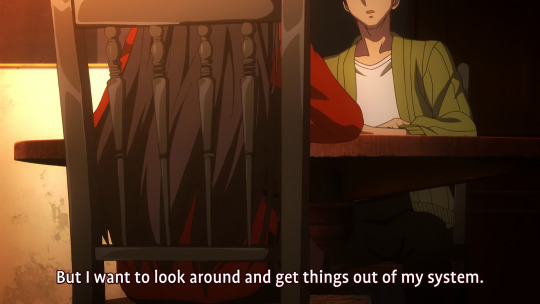
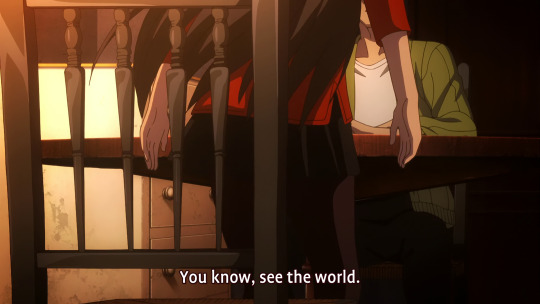
Rin and Shirou’s relationship is going to face a lot of issues. It’s not going to be easy. A clash of wants is inevitable. But Rin is willing to make it work. She is going to make it work. For both of their sakes. The beauty of Rin and Shirou’s relationship is in its striving towards an ideal; it can never be perfect, but it still comes close to being so. Its imperfections make it more than perfect. Theirs is a relationship just like any other—filled with ups and downs. The proof of their love is not in the absence of problems, but in their having the patience, understanding and mutual respect to overcome them, together. Many people when praising the Shirin pair like to adduce its being the most “realistic” of the three VN relationships in its favour. I think such people are doing it a massive disservice by doing so. Shirin is wonderful because it’s a highly idealized version of a normal relationship. Just look at the episode! Their love story is a like a fairy tale! The entire story is about Rin and Shirou, partners in crime; just the two of them against the whole world. Falling love in the midst of a conflict filled with strange mystic mages and legendary heroes from the past. And yet... it feels so down to earth. It feels like something that could occur in your own neighbourhood. What makes me love it so much is this careful but amazing balance between reality and fantasy; it’s just the story of a boy and a girl falling in love... but it feels like a grand epic. Both of them are strange and downright weird people... yet they are also just two regular teenagers, doing regular teenage things. Two regular people, stuck in extraordinary circumstances where they don’t belong... and making the best of it. Together. And nothing exemplifies that more for me that this one final scene at the end of episode 25, perfectly encapsulating why they are so great.
Many people lament the absence of more physical affection between Rin and Shirou, in both the VN and the anime. I sympathize with such people; I myself wish we had gotten many more hugs, kisses and cuddling than we did. And yet... I feel as though in decrying what is not there, they fail to appreciate what was there. Because frankly, few things have made me as emotional as this one handshake.
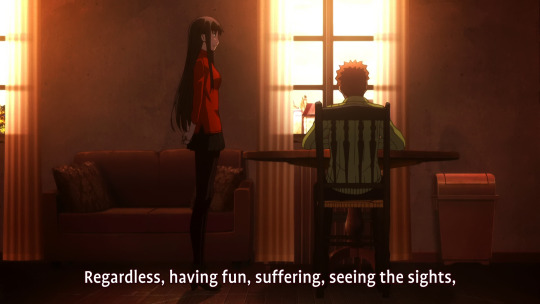
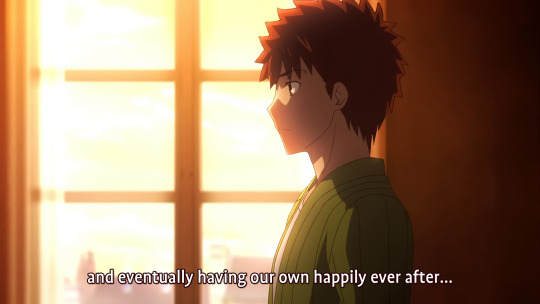
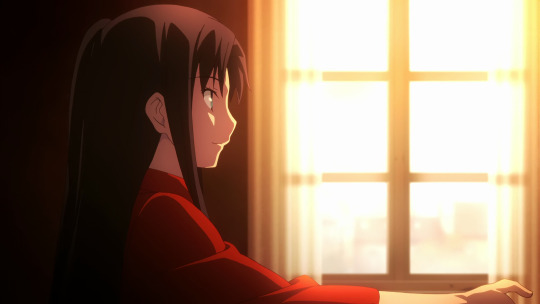
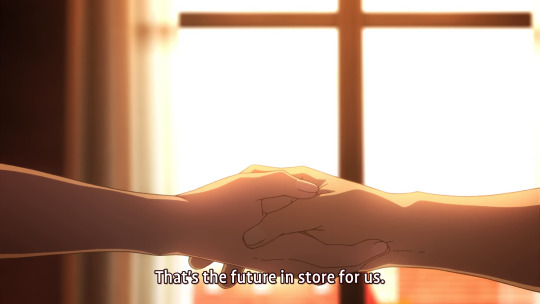
#shirin#rinrou#shirou/rin#rin/shirou#shirou x rin#rin x shirou#shirou emiya#Emiya Shirou#rin tohsaka#tohsakarin#tohsaka#tohsaka rin#fate stay night ubw#fsn ubw#ubw#fate ubw#fate stay night#fate stay ubw#unlimited blade works#ubw anime#2014 ubw#visual novel#one true pairing#otp#romance#anime romance#anime#fsn analysis#fate analysis#fate stay night analysis
49 notes
·
View notes
Text

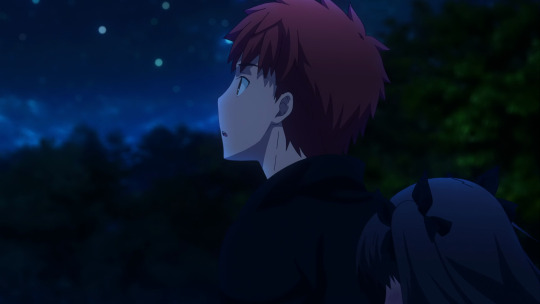
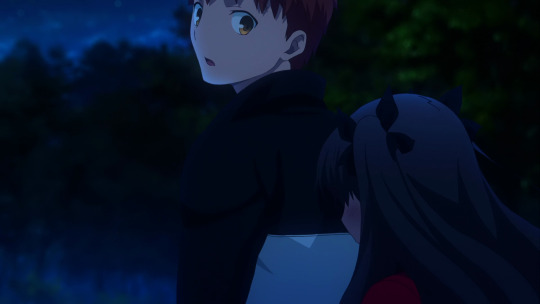




Please help, I can’t stop crying
2 notes
·
View notes
Text
The thing about Rin in Heaven's Feel is that nobody actually gives a single fucking shit about her.
It is deeply ironic; deeply ironic in a very contemptible manner. It is rather infuriating, for me personally—to see this rather complex and intricate character be so thoroughly underappreciated in any truly substantive fashion; to see people gloss over her brilliant and nuanced characterization in UBW; to see her—admittedly considerably less-written—HF incarnation reduced to a few easily digestable scenes, tragically overlooking the deeply imbedded nuance in the story; to see people fawn over an inferior iteration of the character at her peak—only to then not voice a single complaint when said iteration gets butchered beyond recognition.
The thing about Rin in Heaven's Feel is that nobody actually gives a single fucking shit about her.
The Heaven's Feel film trilogy adaptation by Tomonori Sudou is... not good. Not in the slightest. Explaining why it's all so bad would require a lengthy, thorough essay of its own; and frankly, I would rather this blog remain but a place for my venting my random frustrations about the discursive strictures fettering any proper analyses of Rin as a character—and above all, as a love interest—in the broader ecosystem of the FSN fanbase... admittedly so completely arbitrarily, but alas. But ultimately—it is quite revealing to observe what are the most common complaints that people about said adaptation after a careful perusing of online discussion of the films: the fact that the films did not give important side characters like Illya and Kirei their due. For such important characters, not enough time is devoted to fleshing them out as complex and nuanced conscious actors in the story.
Which is quite interesting since there is another exceedingly prominent character that receives an interesting and peculiar arc of her own.
Tohsaka Rin.
Rin's role in the story is reduced substantively and much of her characterization is actively butchered... yet none care.
Well—it's quite simple! If you are someone who adores Rin as a character and as a love interest for Shirou, then HF is really primarily a sideshow for you. The core of Rin as a character is to be found in UBW; thusly, her dedicated fanbase cares mostly about UBW. And UBW got an adaptation that most Rin fans utterly adore—for all complaints one may adduce against the 2014 show (most unfair and incorrect in my estimation), most people who like Rin agree that it at the very least did our girl justice. So what if HF didn't do her justice? We got to see Rin and her Emiya-kun in London!
And if you are someone who only cares about Rin inasmuch as she is Sakura's sister, and a foil to her in her own arc, with no appreciation of her in UBW—then you don't actually care about Rin. You don't understand her at all, and I hate you, and you should shut the fuck up about her.
The other thing about Rin in HF is that she's not some profoundly well-written character.
Her arc has no real meat—unless one, of course, takes into account how her arc in HF relates to her arc in UBW and how one analyzes Rin from a holistic perspective. But no-one does that... So we'll leave that for later. It all really boils down to "Rin don't like her sister... but then she DO!!!!" Brilliant. Riveting stuff. Perhaps one might cry out folly; it is a crime to be so reductionist with how the character is written. And that would be true to a certain extent—the way the story is executed certainly elevates a lot of the meagre, flaccid writing. But ultimately, Rin still basically just boils down a girl struggling between her humanity and her commitment to magecraft. Which is what Rin is—but without all of the richness, depth, nuance, flavour, brilliance that really takes that rather simple conflict and fleshes it out beyond what anyone could have imagined would be its potential... of UBW. The arc has no added complexity beyond Rin steeling herself for a whole route—before at the very changing her mind, suddenly. The effectiveness of the moment is greatly enhanced by the presentation: the way the CG is drawn; Kana Ueda's delivery; the music; the je ne sais quoi; etc. It's ultimately a testiment to how one may take a very simple story, and make it incredibly compelling and involving and wonderful...
But it is still, ultimately a very simple story.
And Rin in Heaven's Feel, viewed in isolation from her characterization in Unlimited Blade Works, is a very simple character.
Which is why no-one gives a shit about her.
Can anyone really think of a single person who considers HF Rin to be superior to UBW Rin that would consider Rin their favourite character? Or in their Top 3 FSN characters? Top 5 even? Anyone who wasn't already drawn to and fond of her character, who was ambivalent on her, but then were suddenly blown away—to the point she clawed her way all up to the top—simply because of that CG of Rin hugging Sakura?
No such person exists.
Why?
Because HF Rin is a mediocre character.
Past all the whiny melodrama and tearful theatrics—which are, admittedly, fairly effective—there is no substance.
Hence:
No-one gives a shit about Rin in HF.
There's only so much actual passion a character on the upper bounds of mediocrity just barely missing being actually good can actually inspire—which is why people usually praising her to high heavens (not entirely earnestly, mind you) are Sakura fans who only care about Rin and her feelings and her struggles and her own meaningful characterization inasmuch as she serves as a therapeuth for Sakura, and nothing else. Rin is good because she makes Sakura feel good—and isn't that wholesome!?!? But pierce the veil the veil of wholesomeness—and one finds but the empty void; Rin in HF is a lifeless husk. She is but a homunculus to serve as a means to assuage Sakura's guilt and make her happy.
Except—she isn't. While the HF Rin that exists in the popular consciousness is naught but a 6/10, the ACTUAL HF Rin is a shining 10. Rin in HF is an amazing character—it's just that people don't deserve her. And the HF films failed to capture that. Because Sudou is one of those aforementioned Sakura fans; and the way he treated he is arguably worse than the way he treated Kirei and Illya.
Here, it might be worthwhile for me to link a previous essay of mine. One that admittedly is exceedingly flawed and perhaps ought to be substantially rewritten, but one that I think nonetheless succeeds at conveying the core of Rin as a character—not just in HF, but the whole of FSN. But I shall attempt to within the bounds of this essay summarize key points in order to explain why the HF films just butchered her so thoroughly.
In essence; Rin is defined by her relationship with Shirou. Rin is Shirou's foil. The two are meant to be contrasted, for the many parallels and similarities are accompanied by complimentary contrasts; while both are held back by the legacies of their fathers and ultimately transcend them by making the same essential realization in UBW, the way they get there is substantially different—Shirou's being more... tumultuous. And in HF, the key difference between them is that Rin doesn't try to save Sakura, while Shirou does. Because it is impossible. And Rin doesn't do the impossible. Because unlike in UBW, where she is under the influence of her Shirou—her behaviour being contrasted not just to HF Shirou's, but to her own from the previous route—she has no-one to truly encourage her to embrace her human, idealistic side over her machine-like magus upbringing. Rin saves Shinji, despite his attempting to rape her; but she doesn't think of saving Sakura until the very end, when she can't kill her. Shirou is the personification of Rin's human idealism—just as Saber is Shirou's. Her desire to never quit; no matter what. Buried deep inside years of conditioning to act opposite to that.
It's why her high jump confession is the single greatest piece of characterization Rin receives in HF. It is the key to unlocking Rin as a character—not just in HF, but arguably in FSN as a whole. It is about who Rin is at her fundamental core.
And the HF films fucking ruin it.
How, exactly? Oh... let me count the ways.
Let us begin by analyzing the surrounding context of Rin's confession to Shirou in the VN, and then in HF. In the VN, Shirou has had sex with Sakura three times by then. The two of them are quite firmly in relationship territory; it is quite safe to say that, in fact, there's no chance whatsoever of Shirou's switching rails to court Rin instead. Rin and Shirou have spent an entire route interacting almost every single day with one another. The situation in the HGW has only gotten graver, with the Shadow having killed hundreds of people by then. When Rin gives Shirou what essentially amounts to an admission of her feelings for him, she is releasing pent up stress from the war, as well as seeking a resolution to her feelings... now that any chance of her being together with Shirou has essentially passed. It's a moment of vulnerability for Rin; it is important that it come during a period of high stress for the characters, stuck in the Emiya household as the world around them unravels and they have no means of achieving catharsis—especially given that Rin has interacted with Shirou enough, and has witnessed enough of his stubborn courage to save Sakura, for her to fall in love with him, while knowing there is no chance of her getting to consumate that love. Ironically, Shirou's unbridled displays of affection for Sakura charm Rin as well...
Now, essentially none of this holds true for the HF film trilogy. There are basically no scenes of Rin and Shirou interacting casually and bantering (read: flirting) with one another; the only time we ever see them interact is on the battlefield; Shirou and Sakura have not had any sex at all by that point; the confession itself occurs just after the Shadow kills Archer, as opposed to a prolonged and arduous period where the characters are left feeling helpless and powerless, completely come over with despair, their relationships with each other decaying ever and ever more. Simply put, the character has no actual reason to confess at all; Rin is a character who suppresses her emotions. Who was taught to see such human traits as a weakness that prevents one from becoming the truly amoral magus.
She also hasn't really been socialized like a normal person either—she feels awkward when trying to express her feelings, and her affection is clumsy. This really shows through in the way Rin behaves when she relays to Shirou her experience of the high jump; she's very clearly embarrassed. She is forcing herself to tell Shirou how she feels and she is clearly uncomfortable; constantly blushing, and with body language that conveys vulnerability. It's a moment that Rin takes very seriously—because Shirou isn't just a crush for her. He is the encapsulation of all that she pines for; he is her inspiration. That moment of his stubbornly refusing to back down meant a lot to her.
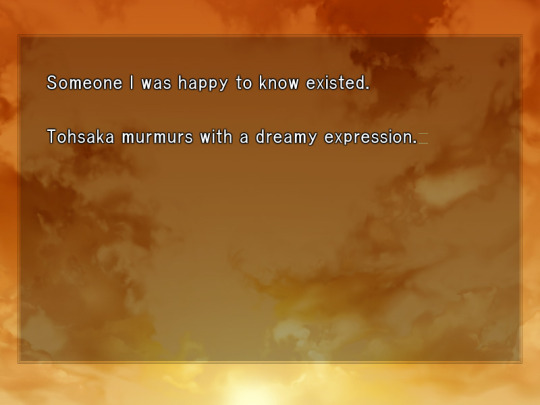
Not in HF2 of course! The worst film of the trilogy by far has her treat her single most precious memory as a fucking joke. Rin in the films is completely at ease when conveying the story to Shirou. She is upbeat and whimsy when retelling the events that are of concern; she has a smile all the way throughout her entire recollection. She even fucking chuckles as she's telling the story. And Shirou fucking laughs. He fucking laughs. In the VN, he is basically rendered speechless—he offers a few perfunctory observations of Rin and her emotional state to further articulate some of what Nasu probably felt could not be adequately conveyed through the dialogue, for the sake of the audience; but he does not offer any lengthy commentary on what Rin had said to him. He is so shocked by what he has heard that he really isn't capable of processing it. Because Rin Tohsaka just confessed to him. She obviously still means a lot to him, even in the routes where he doesn't fall in love with her; yet the film has him fucking laughing at the confession. And it only really helps to reinforce just how seriously Rin herself takes the conversation as well—not at fucking all. The film ironically takes Sakura's own biased perspective of the events in the VN at face value and adapts Rin as though she were an all-confident girl who keeps ignoring her suffering and desires—glossing over her own suffering, her own unique characterization, her own nuances, her own desires, her own dreams, her own conflicts, her own perspective.
And why? Why is the film adapted the way it is? Why is the high jump confession moved so much earlier in the story? What is its purpose in this heavily altered version of the story?
To lead to Sakura's stupid piece of shit sex scene.
That's it.
It's to allow a segue into a cheesy, superficial pandering piece of shitty fanservice—while also surgically removing any and all indication that Rin and Shirou like each other despite the latter's growing feelings for Sakura regardless of whether or not it negatively impacts the story; because Sakura's resentment of Rin's closeness and chemistry with Shirou is crucial to the escalation of the conflict between them. Because even putting aside the more nuanced aspects of her characterization, the films fail to coherently and successfully adapt even the most simplest of basics about her character either—Rin never acts cruel towards Sakura, she never belittles her, she never acts cold when interacting with her; it's the single most barebone adaptation that could've possibly been made. And frankly, the entire fight scene is fucking dogshit too, as is the hug between the sisters; it has none of the pathos and gravitas of the VN. The fact that there was no build up towards it scarcely helps it.
Even from the narrow perspective of the average moron who doesn't comprehend Rin in the slightest, the film still fails to capture of positives of their Rin, despite her being a dry, mediocre and ultimately shallow character.
Yet none complained; because they couldn't give less of a shit about Rin.
And thusly—Rin was reduced from an excellent, nuanced and thoroughly developed character, to naught but a prop that exists solely to make Sakura feel good. Rin has no existence, no characterization, no depth, outside of her being someone to stroke the ego of Sakura fans and their favourite character; a fucking comfort pillow.
And no-one cares—either because they are so deeply satisfied with the way Rin was handled in UBW, whether the route or the anime, (which, I honestly can't blame them) or they're fucking drooling morons who don't like her in the first place; if you don't like Rin in UBW, you don't like her at all. That's the simple truth of it all.
The thing about Rin in Heaven's Feel is that nobody actually gives a single fucking shit about her... except me.
I am tired like feeling I'm the only person who truly likes and appreciates this character.
I know it isn't true. I've spoken to plenty of people who have articulated and espoused many of the analyses I have written of the romance Rin has with Shirou, and how the way that Rin is written in HF helps add further depth to it retroactively. And yet... so much bullshit still pervades discussion of FSN online.
It really does pain me to see the way people discuss this wonderful, amazing character; to see her continually get reduced to being just Sakura's sister—while having the sheer audacity to believe and argue that UBW reduces Rin to just a "babysitter" for Shirou with nothing else truly defining her.
I am sick and fucking tired of seeing people talk about her the way they do.

I've come really to loathe and resent this moment. I really have.
It has completely distorted people's image of Rin. It has completely destroyed online discussion of Rin.
I've come to think that having her be the deuteragonist of FSN was not worth it at all; for all the sheer amount of depth she receives from being so, the amount of horrid takes that one is forced to sift through because of her arc in HF is too great a trade off for me. I sincerely think that shit takes about Rin online would have bee insanely more bareable had it not been for HF; had it only been people saying she received no development at all.
But you now what really fucking sickens me?
People who dare have the fucking GALL to express fucking "pity" for her.
"Oh I wish Nasu developed Rin a bit more in UBW she has no arc there!"
"I WANT to like Rin and she has great potential but it was squandered!"
"OOOH if Nasu does an FSN remake, he should rewrite UBW so Rin gets a whole lot more development there! It's an amazing opportunity!!!"
...just who the fuck are you to express pity for this character? You didn't even have enough respect for her to pay attention to a single one of her scenes in UBW or piece together how she works as a character. Nasu wrote an incredible nuanced arc for her and you didn't even have the basic decency to appreciate before thinking you have any fucking right to talk about how sad you feel for her because she got "shafted in her own route."
Go fuck yourself. Seriously, if you're reading this and you've any one of these opinions, I want you to know that I despise you and you should just shut the fuck up. Don't talk about Rin. Don't even fucking mention her. Don't look up art of her. Don't even fucking THINK about "handing it to her." You haven't got the fucking right. Your opinions are worth shit.
The thought of an FSN remake just makes my fucking stomach churn. The idea of Nasu rewriting UBW—which I quite honestly consider to be as close to perfection as a story can possibly get—feels me with terror and dread. I can only imagine how more fucking awful it would make discussion of Rin, UBW and her role in it and FSN as a whole. I can easily foresee; Nasu changing Rin's romance with Shirou to the point it's fucking unrecognizable. Just to pander to stupid motherfuckers who didn't like it in the first place. Adding a bunch of sappy, pukeworthy melodrama and lengthy monologues screaming the fucking themes and characterization in your face; as opposed to the subtle brilliance of UBW as it actually exists. Nasu is going to abandon people who actually liked Rin/Shirou and UBW for what is was... all to please people who never liked it, and never would have liked it in the first place. I am not sure I would be able to brave through all the braindead comments about how much fucking BETTER the remake's romance is than the original—all by people who liked that shitshow of romance in HF. And even worse? If Nasu does decide to leave UBW alone, then people are still going to be insanely insufferable. "Oh boo hoo, Nasu could've fixed the romance and Rin's character, but he didn't! Isn't that sad BOO HOO" Fuck off.
You know what I think? Rin shouldn't be in the fucking remake at all! Just remove her. Completely remove her from the story. Rin doesn't fucking exist. Replace her route with the Illya route. "But what happens to Archer?" I'm sure Nasu can think of something. Illya and Rin are actually quite similar; I'm certain some of the latter's functions in the story can be transplanted over to the former. But really—I don't care. The FSN fanbase does not deserve Rin. At all. They should not have the opportunity to even glance at her; clearly, she was too great for them to appreciate. I am sure some of the more vile pretend-fans lamenting her "getting shafted" will still sully her name by deigning to "pity" her; but at the very least this will be great way to spit in their fucking faces.
...
...
...
Frankly... there are some days where I wish Rin hadn't existed at all.
But I think there's a silver lining to all this.
Because I think seeing all this scum just completely misunderstand Rin has made me appreciate her romance with Shirou more—and how much he truly loves her.
Because anyone trying truly comprehend Rin in UBW and how the storytelling slowly unravels her nuances is relying almost wholly on storytelling conventions and tools which allows to deduce aspects of the characters by the very fact that we as an audience understand that we are experiencing a story; a story that has had many of its elements structured in a particular to produce a narrative that is compelling and involving. It is thus easier for us as viewers to realize things about the characters in a story than it is for others in a story to make the same realizations. It is easier for us to understand Rin, not only because we are allowed an objective birds eye view of the events, but also because Rin is actively being contrasted with Shirou. And taking Shirou's character traits into account allows us to make inferences about Rin. The two characters interplay with one another, and that allows us insight into both. There is also the fact that so much of what we know about Rin is revealed to us through Shirou, who in his dialogue and monologue describes so much of Rin's neuroses so amazingly well. As well as that we have a whole other route which further contextualizes Rin's behaviour. But Shirou himself of course exists within the confines of the narrative; he has no alternative set of events to compare how Rin behaves differently between both and why; and he has no narrator to point out to him Rin's flaws, her anxieties, her strengths and her inner conflict.
Shirou has no help over the course of the story. It's just him and Rin. He figures her all out... all on his own. Simply by being around—interacting with her, talking to her, fighting alongside her, observing her—he is able to peer deep into her heart and understand her even better than she does herself. He is able to achieve something people with far more information available to them were simply unable to do—and I think that that speaks as to just how much he just really loves her.
The FSN fanbase certainly doesn't deserve Rin, not at all; but Shirou most certainly does. I think that he's quite literally perfect for her.
And I wouldn't want it any other way.
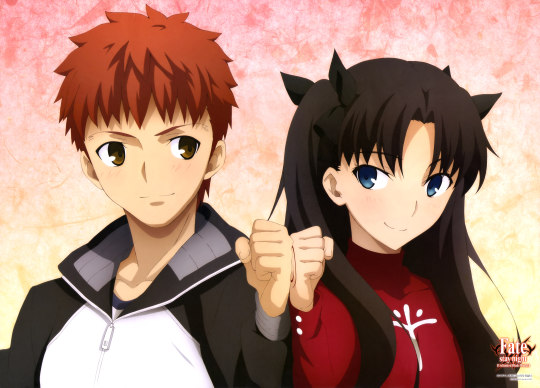
I just love these two so damn much. Seeing them cute and happy together makes all the bullshit worthwhile in the end. I am so happy Fate/stay might exists. I am so happy the 2014 adaptation of UBW, which is what got me into Fate, exists. I never would have had the chance to be entranced by either of them.
They really are amazing, and deserve esch other.
#fate stay ubw#fate stay night ubw#fate stay night#unlimited blade works#shirin#tohsakarin#rin tohsaka#heaven's feel#shirou emiya#fate#hf route#fate stay hf#fsn#emiya shirou#fuck sudou#they are my precious babies#i love them so much#i kind of just felt like venting after seeing some very stupid discussion online#hf movies#read the vn#rin/shirou#shirou x rin#seriously though why is no-one pointing out how dirty rin got done in the hf movies#no but really aside from a few minor changes for fanservice reasons why would you rewrite shirin it's basically perfect#in fact just like rin the fact it isn't perfect makes it more perfect
30 notes
·
View notes
Text


Why does Rin try to save Shinji at the end of UBW, but spends most of HF thinking she shouldn't try saving Sakura?
If you've been in the FSN fandom long enough you've probably heard at least one variation of this claim—"Rin only receives character development in HF." "Rin gets sidelined in UBW in favour of Archer." "Rin got robbed in UBW." If one truly pays attention to the story however, one can clearly see just how utterly ridiculous and nonsensical all of these claims are. In fact—to say so isn't merely to betray just how little one understands UBW Rin, but also how little one understands HF Rin too. Because without UBW, Rin is nothing—HF is in constant dialogue with UBW. This applies to Rin as much as it does Shirou. HF is consistently begging us to compare how Rin behaves therein to how she behaves in UBW, because the contrast reveals much about the core traits of the character. HF Rin is nothing if not viewed in the context of UBW. To understand what precisely I mean here, we have to ask a question:
Why does Rin try to save Shinji at the end of UBW, but spends most of HF thinking she shouldn't try saving Sakura?
The answer to this lies in one of the best scenes in the whole of Fate/stay night—the scene featuring Rin's half-assed yet nonetheless sweet and touching confession to Shirou in HF; her remembrance of his trying to jump over that pole that it was oh so obvious he could not.

Forget the final confrontation with Sakura—this is where the essence of Rin's character in HF lies. Because this scene is all about why Rin acts the way she does toward Sakura, about what separates her from Shirou—and ultimately, what separates her from herself in UBW:
"…But even he knew it was impossible. He knew nothing would change that, but he kept trying. It's as if he believed the effort was what mattered."
"To be honest, I can't do such a thing. I've always been like that. I determine whether or not something is possible. If I know it's impossible for me, I quickly give up. I don't try what I can't do, and I never regret it or think I'm powerless because of it. I'm cold like that. I'm a terrible person. Kirei called it machine-like instead of cruel."
But Tohsaka isn't belittling herself. She's proud of how she is.
"But I do sometimes think how pure it'd be to just keep trying without a thought for whether it's possible."
[...]
"In short, I can't do it. I can't protect Sakura until the very end like you, and I don't intend to either."
"———Tohsaka."
"I told you, right? I don't do impossible things.
As long as I'm Tohsaka Rin, I'll kill Sakura the moment I determine that it's not possible to let her go on. Well, I don't need to say it again because that was our deal all along, but I thought I'd remind you."
The high jump scene has many purposes. One of them is to elucidate upon one of the core aspects of Rin's characterization—the cold pragmatic, calculating and thoroughly realist Tohsaka beyond the surface of which hides the warm, kind and idealistic Rin; who Rin believes she ought to be in the pursuit of her father's ideal, and the good moral heart that beats within her, threatening to burst out at any moment. It shows that Rin is simply too much of a realist to try and save Sakura like Shirou does when it appears basically impossible to do so—so she instead tries to kill that good-natured side of her. Nonetheless, we are left with the question:
Why does Rin try to save Shinji at the end of UBW?
As Gilgamesh himself points out to Shirou—it's pure hypocrisy! You can't save everyone. Rin's attempt to save Shinji from the Grail actively impedes upon their goal of destroying the supposedly omnipotent wish granting device and saving the world from Gilgamesh. From what we are told in HF (on the surface at least), Rin shouldn't be doing this—it's impossible. It's idealistic. It's naive. It's what Shirou would do.
It's what Shirou would do.
The boy whose youthful idealism and naïveté Rin found so inspiring.
The boy she wishes she could be like more—whether she is willing to admit it or not.
And that is the difference between Rin in UBW and Rin in HF—one enters a romantic relationship with Shirou, and the other does not. One develops a deep emotional bond with Shirou over the course of the story wherein his influence slowly and steadily forces her to accept that human side of herself that had always lurked beneath her, to embrace her idealism, to pursue Shirou's impossibly beautiful dream as relentlessly as he does; the other ends up at odds with him at too many key junctures of the story to develop the same intimate relationship, especially as Shirou starts to fall for someone else.
That is in essence the purpose of HF—to provide a counterpoint for Rin's arc in UBW, to show us the depths Rin will fall to when Shirou isn't there to encourage her to be the best she can be, to quit struggling against her human side, to abandon her attempts to kill her own emotions and to surrender herself to her desire to be as idealistic and hopeful as he. If UBW shows us Rin at her best, the purpose of HF is to then contrast that with Rin at her worst. Because at the end of the day, Rin serves as a relative straightman in a cast of deeply mentally disturbed characters. She serves as a foil to Shirou. The reason her route is also the Shirou route (as one Tiger Dojo puts it) is because Rin as a character does not need to be saved—nay, she is quite capable of saving herself. Rin doesn't need Shirou; but she sure is better off with him by her side. At the end of HF, Rin, despite not being as deeply under the influence of Shirou as in UBW, still chooses her human side over being the magus her father would've wanted her to be. Rin has issues... but those issues don't run as deeply as those of other characters. Shirou in particular. She may struggle more but she can do it. Nonetheless, Shirou's positive influence on her cannot be denied.
So—Rin clearly has an arc in UBW. How, precisely, does this arc unfold? How does UBW explore her character?
Up to about Shirou's defect, which per the anime would be somewhere around halfway through the route, UBW is a study in contrasts—the story presents with a carefully crafted waltz between Rin and Shirou which allows us to peel back the characters' layers. It starts with the prologue. Day 3 is of immense importance here since it emphasizes upon different aspects of Shirou's character than Day 3 of Fate does. Instead of focusing on Shirou's suicidal tendencies, the confrontation with Illya and Heracles focuses on Shirou's weakness and the fact that he isn't a proper mage. The focus is on how he freezes when Saber and Berserker start fighting. Why? Because he's being contrasted with Rin—a talented mage who retains her cool under pressure, being fully capable of keeping up with the fighting. Unlike in Fate (and HF), Archer's being uninjured means that Rin can actually participate—and the gulf between Shirou's abilities and hers couldn't possibly be more obvious.
Day 4 continues this with very clever use of side characters like Taiga, Sakura and Ayako (the latter of which is even responsible for the "Shirou never smiles" moment!)—they are used to emphasize just how normal Shirou's life is and how little he takes the HGW seriously, in contrast to Rin, who spends her day and night hunting after Caster. It cleverly continues the contrast between the double life Rin is shown leading in her prologue and the relatively uneventful, suburban Japanese life that Shirou leads, aside from his late night magic training. In fact... Archer himself points this out for us at the end of Day 5, as he escorts Shirou home:
"…Are you saying you don't smell blood on me?"
"Of course not. You're not fit to be a Master in that regard either. You are different from Rin."
"———What is that? Are you saying you can smell blood on Tohsaka?"
"Yes. She is rather kind-hearted, but she's merciless when she has to be. She wouldn't go around looking for other Masters every day if that wasn't the case."
"———"
She's looking for other Masters every day…? That means she's fighting other Masters. It's not like it's over once she finds a Master. Then———
Of course, that's minor in comparison of what else happens on Day 5.
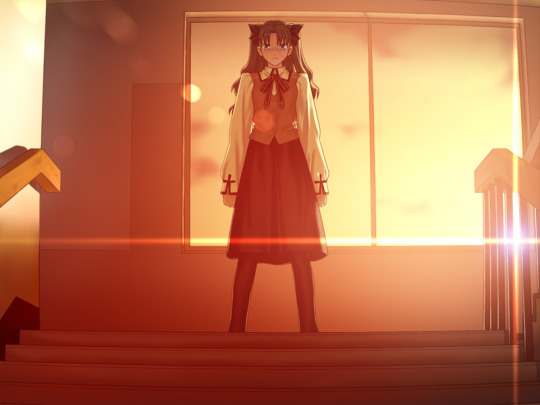
Stories are by nature defined by conflict. Conflict is the essence of storytelling. It's thus quite logical that Shirou has the worst relations with Rin at the start of her very own route than any other since it puts him in a position where he can discover the most about Rin. And Rin's decision to attack Shirou ends up revealing her inner conflict—the conflict between her commitment to being an unfeeling, machine-like magus, and her own personal feelings and desires, in this instance namely being her feelings toward Shirou. It is on Day 5 that Rin reveals the expectations that are placed on magi since their very birth:
"…What I got so angry about was how your dad never did anything against that. 'Magic' of a magus isn't just his magic. Magic is something passed down from parent to child for many generations. It's the 'sum of their life's work'. The responsibility isn't just yours."
"So the first condition for being taught magic is that you will pass it on to later generations. A child born into a magus's family instantly becomes a successor and an inheritor. ———We are born for that reason, and we also die for that reason."
"A magus' child isn't human from the start. No, it is the duty of the 'magus' to change what is born human into something else through many years and hard training. …That's why your dad isn't a magus. Your dad chose to be a parent over being a magus."
Of course, there's a bit more to this because Day 7 adds some more complexity to the matter here by having Shinji reveal to Rin that he is also a Master. And her reaction? She ignores him. She doesn't consider him a threat so much so that she decides not to attack him or even formulate any kind of plan for attacking him later. Seemingly this makes no sense. Why attack Shirou, but not Shinji? Because her decision to attack Shirou wasn't a pragmatic one. She attacked him because she feared that his participation in the HGW and her "objectivity" would be undermined. Rin is struggling desperately to maintain the perfect, strong, ruthless and emotionless magus facadé, and her feelings for Shirou are the greatest threat to it. She wants to remove him from the HGW so that he doesn't end up tempting her to succumb to her more human instincts. It goes to show how everything about Rin's claiming to be a ruthless, machine-like magus is just utter bullshit—Machiavellian magi wouldn't warn an opponent to take them seriously in a free for all to the death, like how Rin warns Shirou to do on Day 4; they would just kill them! Not to mention that we get to see Rin's "fail at the most important thing at the most important moment" complex again—despite how rational, intelligent and competent she has made herself out to be, and proved herself to be, she still ends up not realizing that Shinji is behind Bloodfort!
But that's only scratching the surface of what Day 7 does not only for Rin but for Shirou also—because Day 7 is represents a massive turning for Rin and Shirou's relationship, and for them as individual characters. It's the day when the hitherto carefully crafted dichotomy between Shirou the helpless novice and Rin the talented, highly competent novice... gets subverted.
Although the Bloodfort sequence certainly does not completely reverse the hitherto established dynamic between Rin and Shirou, it does severely undermine it. Because as Bloodfort is set up and the student body collapses, as the skin off of many of their peers starts to melt, Rin is deeply shaken and visibly disturbed, barely able to hide her trembling legs. And Shirou? Well... he's used to seeing dead bodies. Bloodfort is a brilliant sequence. It lays down the foundation for Rin and Shirou's relationship for the rest of the route because it forces for the very first time to truly face each other's issues. Faced with a horrific nightmare, both of them end up exposing a side of themselves they never otherwise would. Rin realizes that there is something deeply wrong with Shirou, and he gets to see just how much she is suppressing her human weaknesses and faults in order to maintain her strong and fearless talended mage facadé. The carefully crafted set-up has reached its pay-off as the characters start to find out ever more about one another.
Day 10 represents a massive turning point in UBW—it's where the route reaches the second of three junctures (the previous one being Bloodfort—which establishes that Shirou's issues are worse than Rin's, but still maintains an overall focus on her) that transition the story to fully committing itself to being the Shirou route. It does this establishing the core difference between Rin and Shirou in the beautiful and amazing scene called Shirou's defect—where Rin and Shirou discuss each other's lives in Shirou's courtyard. Heretofore the story had brilliantly weaven in parallels between the two—namely, that both of them are defined by the struggle of living up to the ideal they inherited from their father and their achieving their own personal happiness. Rin's being a mage is basically the same as Shirou's issues with his trying to become a seigi no mikata. Yet—Rin is a hedonist. As she says, she wouldn't do something if it wasn't fun. Rin may have inherited a duty from her father, but she wouldn't do it if she didn't find it fun. It establishes an important dynamic—Rin doesn't need Shirou to save her, she's perfectly capable of saving herself. That doesn't mean he is irrelevant however. Because Shirou may not actively and directly help Rin resolve her issues (for the most part), he certainly does do it indirectly, by serving as an example, inspiring her to be better, to be the best she can be. It's Archer's attacking Shirou, and her seeing his memories as dreams, that force her to confront her feelings for him, because she cannot help but be concerned for him and his well-being. Over the course of the route, she can't help but succumb to her human instincts. She starts relaxing around Shirou. With each new conversation she starts to let go of her commitment to the magus facadé. She starts to interact with Shirou less as a fellow participant in the HGW, and more and more as a person. Rin doesn't ask Shirou if he had and has fun being a mage because she has anything to gain strategically; she asks because she wants to get to know him. As a person. And get to know him she does...
But UBW's being the Shirou route does not preclude its analyzing Rin in-depth. Far from it! Because while it may not deal with Rin's issues directly, it certainly does so indirectly, through her reactions to Shirou's character arc, which itself ends up pushing her own arc further and ever further along.
First, there is her reaction to Shirou's losing Saber. Having spent a decade isolating herself from the rest of the world, Rin has become quite emotionally stunted. She isn't the best at properly expressing her emotions. So when Shirou ends up emotionally broken, Caster basically literally robbing him of his ideal in the form of Saber, and left helpless, Rin defaults to her cold uncaring magus persona and ends up rubbing the salt in his wound. Given that she fully intends on giving Saber back to him upon defeating Caster, the rational and sensible thing to do would be to act nice to Shirou, to be affectionate toward him. But as with her trying to attack him on Day 5, Rin is more concerned with looking like a cold pragmatic and ruthless magus rather than actually being one. She clearly has feelings for Shirou, and she is desperately trying to bury them by acting as cold and uncaring as possible toward him so that she can maintain her "objectivity" and not let her feelings distort her judgement. Of course—her feelings are distorting her judgement! In her attempts to present herself as the ruthless emotionless magus, she ends up revealing just the opposite! And it's even worse when you remember that Rin decides to this after she had decided to leave aside the HGW nonsense and just talk with Shirou like a regular human being.
Then... there's the confession scene.

This scene... represents the last juncture before the route finally transitions to being truly and indisputably about Shirou—without in the process losing focus on Rin. It represents one of the key moments of culmination in Rin's arc that predominately encapsulate the most important aspects of her character, offering a resolution to so much of her inner struggle, thereby allowing space for the rest of the route to comfortably deal with Shirou. And the resolution to Rin's issues... is Shirou.
It's important to remember that Shirou is not a naive character. Or a stupid character. Shirou's issues do not result from some wrongheaded ideological analysis—they result from his (near) complete lack of self-worth. And in the context of the story, Shirou discovering the pendant at Rin's mansion represents a major turning point for the character in that regard. Because by discovering the pendant, Shirou realizes that there was in fact someone out there who valued his life. Valued it enough to save it. And that someone just so happens to be the girl he has slowly been falling in love with over the course of the route. And seeing that Rin values his life... it makes him value his life. Without that Shirou's character development in the rest of the route simply cannot occur. It's important to establish that here.
There's also how Shirou's feelings on Rin relate to his feelings on the ideal. Because they do in fact parallel each other—Shirou starts out with a highly idealized view of both. Yet over the course of the events of the route he comes to slowly understand that his idealized vision was is fact quite wrong. There are in fact serious issues with his ideal and the way he goes about implementing it; just as Rin's is not the perfect honour student he had envisioned her to be. And yet... Shirou still reasserts his faith in both by the end. Yes his ideal is unachievable, but the pursuit of it is still beautiful; Rin wasn't as strong-willed and secure as she had initially appeared, but all those weaknesses end up making her stronger and better in his eyes because she nonetheless succeeds despite their holding her back. Rin can never truly live up to that perfectionist standard she has set for herself, but her valiant effort at constantly struggling to nonetheless to reach it is nonetheless amazing; nay it makes her even more amazing than if she had actually succeeded. In both cases, Shirou is forced to confront the ugly in something he found beautiful—only to come out the other way thinking they are even more beautiful.
Then there's of course Shirou basically spelling out many of the themes of the route:
"That's just now, right? It's irritating, but I agree with Archer. There's nothing for you to regret."
"Why? Caster is doing whatever she wants, and even Archer lost faith in me. This is because my policy was a mistake, right?"
"It's just that you were unsuccessful. You haven't made a mistake. If you haven't made a mistake, you can be proud of yourself even if you were unsuccessful."
———The process. If you walk down the path that you believe is right, you cannot be wrong. …At a time like this, most people will realize that their path is a wrong one, but she's different. Her path should always be one that she can be proud of.
"———Yeah. To be honest, you've always shined. …I won't regret my actions either. I believe what I've done is right, but it's full of stitches."
———I don't want to regret anything. I want to make all the tragedies that happened into meaningful things by believing that my path is right.
Of course... we have to talk about Rin here. We've covered Shirou's point of view so it's important to talk about the significance this scene has for Rin, though it's incredibly difficult to disentangle Shirou's arc from Rin's, since they are so deeply intertwined. Shirou encouraging Rin to get back on her feet, his seeing through her facade of strength when Archer betrays her... it says just about as much about him as it does her.

We already established that Rin is not good with expressing her emotions. We already established she does not have the most healthy outlook on life, with her perfectionism resulting in her bottling up all her doubts and insecurities, and desperately trying to bury her weaknesses. She has no-one to show her vulnerabilities to.
Until Shirou. He gets her to relax. His unbridled idealism wins Rin over. He's the only person who could possibly breach through all of her barriers and earnestly converse with the fragile yet still very strong girl hiding underneath, a girl who doesn't need to be afraid of her weaknesses because she's strong because of them. Instead of burying all her emotions she can just be honest about them—to Shirou, the boy who loves her and whom she loves back. Rin still has a long way to go after this moment. Yet nonetheless... it's a breakthrough. For the first time in maybe a decade... Rin has chosen to drop that strong magus facade and to show her real self. And it's beautiful.
Next up is Your distortion—my favourite scene in the whole VN.
Suffice it to say... this scene is all about Shirou realizing that all along he had pursued Kiritsugu's ideal because it made him happy—just like Rin did being a magus. And all thanks... to Rin. To seeing her cry for his sake. Begging him to care of himself. It's Shirou taking the next step from his confession—and learning the error of his ways:
"I'm telling you that's crazy! Look, if you were saved, take care of yourself! I'm sorry for the people who got killed, but it's only by chance that you were saved! Then you should take full advantage of your good fortune. You suffered such a hell, so it'll be a waste if you don't have fun!"
Tohsaka is seriously angry. "——————" Yeah, that makes me happy. I finally realize now, because Tohsaka is that kind of person.
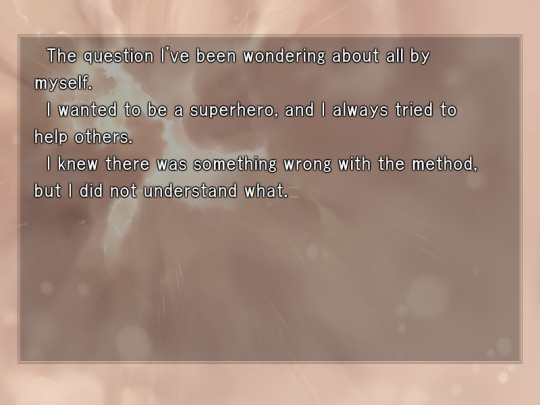
———But it's so clear now. It's because of this person that is seriously angry for my sake.
But what precisely are the implications here—for Rin specifically?
Well on one hand it's just extremely touching to see this deeply emotionally repressed girl be so heartbroken at seeing just how deeply disturbed and distorted the person she's come to love is that she can barely contain the flood of emotion that she feels. Yet it is also noteworthy how she reacts when Shirou tells her that despite the fact that she is right, he nonetheless still believes that there's something beautiful in devoting your life to saving people. She blushes. She gets flustered. Although she tries to act cool afterwards, it is quite apparent she found Shirou's words touching. She obviously agrees with him. But perhaps she's just not that ready to admit that yet.
She will be soon however because Day 14 has her choosing to accept Shirou's ideal. By taking on Saber to be her Servant.
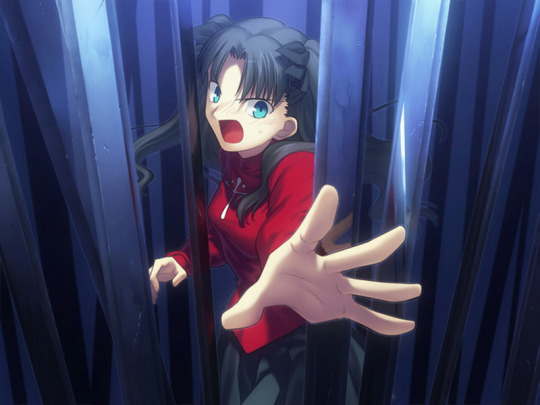
Saber is in essence supposed to be the personification of Shirou's ideal—the fact that Shirou loses his contract with her at the junctures in UBW and HF that he does is no coincidence. Both occur at (or before) points where Shirou's belief in his ideal is deeply shaken. Rin choosing forge a contract with Rin which actually makes Saber stronger than she was under Shirou at a point where she realizes that the confrontation between Archer and Shirou is drawing closer and in fact that the former could in fact kill the latter if she does nothing... it's deliberate. Especially since she this to Archer after he kidnaps her:


Although Rin didn't want to admit it up until, she in fact loves Shirou for the very traits that she has been criticizing him for up until now. The dynamic that defines Shirou's view of Rin is also the one that defines Rin's view of Shirou; just as Shirou is forced to confront Rin's warts only to declare that he loves her even more for them, so too is Rin forced to confront that the very perseverance and refusal to budge in the face of the impossible that had drawn her to Shirou all those years ago could take a toxic form when combined with his lack of self-worth and survivor's guilt. And yet... she still adores him for it. She still can't help but be moved by it. As Kirei says as he nearly rips her heart out:
"You're right. You never give up until the very last second, Rin. At the very same time, you have this wonderful side of you that admits reality. ———Yes. This contradiction is very mellow."
This fundamental inner conflict within Rin is essentially resolved here, with Rin choosing her human idealistic sides that never gives up until the very last second over her cynical and pragmatic magus streak. She gives Shirou her mana with which he is able to use Unlimited Blade Works—an allegory for how her love and support ends up allowing Shirou to make his dream a reality.
And so... we return to the question that started all of this.
Why does Rin try to save Shinji at the end of UBW?
Simple.
It's what Shirou would do.
Rin loves Shirou. He brings out that side of her that her magus upbringing compels her to bury and kill that still manages to make its way back to the surface—because she can't help but feel drawn to Shirou and feel inspired by his example.
It's what Shirou would do.
UBW isn't like Fate and HF. It's not about Shirou saving a heroine (though, if I were fully honest, I would not say that Fate and HF are truly comparable). It's about a heroine saving Shirou. It's about Rin saving Shirou. Rin doesn't get saved by anyone.
But that's okay.
Because saving Shirou? That's Rin's salvation.
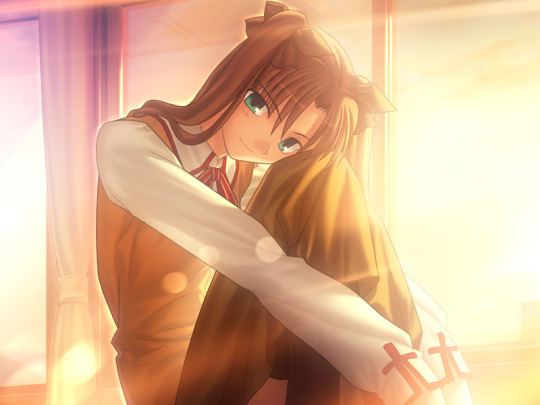
#unlimited blade works#fate stay night#fate stay ubw#rin tohsaka#shirou emiya#tohsakarin#emiya shirou#shirin#fsn#fsn ubw#they are my precious babies#i love them so much
22 notes
·
View notes
Photo
In consideration of the mention of a supplementary post which would "nitpick" aspects of my post, I decided to postpone any reply of my own. Though seeing as how it's been two weeks by now and that post doesn't appear to be forthcoming, I should probably address this.
Not like there's much to address anyway, seeing as how the crux of your reply is to completely ignore basically everything in my analysis vis a vis Rin and Shirou's relationship, and Rin's (far more) in-depth character development in UBW (in comparison to HF), only to then reiterate points that you had already made in your initial post(s) while pretending as though they hadn't been addressed in any way whatsoever—"nuh uh" the post, in essence. Who really cares about the existing parallels between Rin and Shirou, thoroughly fleshed out across all three routes, in lieu of imagining some potential storyline where a romance occurs between Rin and Shirou in the context of an HF-like plot because—get this—both of them have siblings! Mindblowing. Profound. Truly in awe at the brilliance of the storytelling here. Yeah the story seeking to draw parallels between Rin's relationship with Sakura and Shirou's own with Illya which really have nothing in common and are defined by entirely different dynamics is definitely far better than the storyline in UBW we actually got where both of them struggle to reconcile their personal happiness and their fathers' dreams which they adopted as their own, and ultimately do so through the exact means. There really is no substance here, especially since you don't even show the courtesy of addressing my criticisms of Sakura's romance in HF. Frankly this feels kinda boring since for the rest of my reply here I'm essentially tackling a few minor tangential points which have no real bearing on the central issues, and the core of the romance between Rin and Shirou.
Yes, UBW does address Rin's issues, to a far greater extent than HF does. I provided plenty of textual evidence relating to Rin's self-esteem issues (which are only touched upon in HF, might I add, in a scene about her romantic feelings toward Shirou) which you once again brushed aside to merely rant out some nonsense. Rin's arc in HF is essentially the same as the one in UBW—one of coming to accept her feelings for an important person in her life at the expense of her commitment to the magus lifestyle. That the cause of Shirou's issues to which Rin's arc is so tied to in UBW is not as directly related to the excesses of the magus lifestyle as it is to Sakura's is absolutely irrelevant—it is merely an incidental detail of the plot, not in and of itself relevant to Rin's inner struggles as a character. It might have been, had the route actually shown Rin reassessing her father and what he had done in the name of the pursuit of the Root, but it does not and Rin's thoughts on her father are mainly shown to us in UBW. Not shocking, considering that's where she receives most of her development and the very core of it. Either way, would Rin at the beginning of the story ask Shirou to go with her to London? No, because Rin in UBW has an arc, however much you want to pretend it does not tackle her issues (or rather supposedly non-existant issues).
No, Rin's happiness isn't solely dependent on Sakura's well-being. This is prima facie ridiculous and just goes to show just how much of a distorted vision of Rin the "fans" of her HF incarnation have (who, curiously, were nowhere to be seen when Sudou completely butchered her in his movies—my my, such dedicated and loving fans). Rin's life does not revolve around Sakura and her character is not defined by her—her relationship to Sakura is on the contrary defined by Rin's neuroses which exist indepedently of Sakura. Your one piece of evidence even showing this to be the case actually even contradicts you on this point—the final line from Sparks Liner High about "the one who would bless them" is referring to Rin's (and Sakura's) romantic feelings toward Shirou. It's about how each of them, having hypothetically killed the other, can only be saved by Shirou's love, and he's dead now. I'm honestly baffled as to why you would even bring up that ending as showing Rin's salvation lies solely with Sakura when it clearly says "No matter which one survived, the one who would bless them is no longer in this world." In the end, what matters is that no matter how many mental gymnastics you may want to apply, Rin is still portrayed as happier in UBW, whether VN or anime, than she is in HF (which is perfectly natural all things considering).
Which leads me to the comments on the anime epilogue—this notion that the epilogue shows that Shirou doesn't really care about Rin or was going to walk out on her is incredibly absurd. Shirou's inner conflict in the episode revolves wholly around how much he does care about Rin. If he didn't he wouldn't be so conflicted about whether or not he should join the Magic Association. The entire point of the (repurposed) flashback, from a thematic and character development point of view, is to show just how grateful Shirou feels that Rin would take him with her to London. So much so that he in fact feels as though not joining the Association would be betraying her. It's perfectly natural for Shirou to feel conflicted and even afraid of talking with her about it. You are demanding some nigh-unobtainable level of wisdom from a 19 year old who is still figuring out his life. Hell, that's a part of why people like the relationship—relationships aren't perfect and suffer from divergent wants and desires all the time, what makes them or breaks them is whether or not the lovers understand each other and are able to communicate well enough to be able to overcome. Shirou and Rin's conversation at the end feels real, despite the almost fairy tale like atmosphere and tone (which is earned, unlike that of certain other routes)—that's why it's great. It's just two people earnestly talking about how to resolve the apparent contradictions between their lives' paths to great effect. This is the balance everyone is talking it—Shirou chose to compromise on his ideals by coming to London with Rin because he wanted to be with her, and now Rin chooses to compromise on her mage lifestyle because she wants to be with him. Yes, Rin and Shirou sometimes express their feelings for each other in a sloppy fashion, but who doesn't? It's charming and ultimately their love shines through, which is all that matters.
And that shows why I don't have to "show" Shirou's issues being fixed because they so clearly are shown to be, both in the VN with poem (which I already posted in my initial reply) and the anime with the final talk—Shirou spends an indeterminate amount of time adventuring until he retires and settles down with Rin to have his happily ever after. But since you insist (and clearly didn't get it)... Shirou didn't realize that the pursuit of his ideal made him happy and that he wasn't driven by survivor's guilt alone in either Fate or HF, which he does in UBW. You speak of how the VN continually talks about the supposed choice between "saving people or saving ideal" but I see no actual textual evidence for this provided. UBW is considered the "balanced" route (with good reason) because in Fate his mindless robotic pursuit of his ideal is what allows him to join Saber in Avalon (the ideal and his love for a woman are one and the same), whereas in HF being with Sakura requires him to completely abandon his ideals (the ideal and his love for a woman are irreconciable). In UBW however, whilst there is friction between Shirou's desire to pursue his ideal and his desire to be with Rin, there is still the possibility for compromise, which Shirou succeeds at achieving. Also, considering Last Episode was added in RN (which despite being pointed in my post you unsurpisingly ignore) and Nasu's original vision for HF had Shirou dying for real at the end of the route, UBW was originally going to be the only route where Shirou actually got to stay with the girl after its events. Just saying.
Yes, I am arguing this really. You clearly keep missing the point of UBW, which I already stated in my initial post (which, again, you haven't properly addressed)—Shirou doesn't care about the ideal in and of itself, Shirou pursues it because it makes him happy. As long as Shirou is happy, that's all that matters to him. And Rin makes him very, very happy. And your entire argument is based on Rin's not being saved in UBW—it's one of the pillars of your entire "theory" or whatever about FSN. However much you want to avoid addressing my thorough analysis of the romance between her and Shirou as well as how Shirou gives Rin a shoulder to lean on in UBW (I suggest paying more attention to the confession scene next time, as well the high jump scene in HF), you can only really do so by conceeding to my points—which, given that since as previously mentioned it is one of the pillars of your comprehensive assessment of FSN there to do so would unravel that very neatly constructed assessment of yours, I highly doubt you will, however wrong it may be.
Archer telling Rin to stay with Shirou is for the sake of the audience, to show them that Shirou will be fine. Shirou's entire arc occurs while Rin is there or is prompted by Rin and her influence—that Rin isn't present for the confrontation with Archer says absolutely nothing, especially when Archer acknowledges her importance to Shirou. Twice. The line about Rin being irrelevant in UBW was a joke. Says a lot that you took it seriously (and that you paid more attention to a single line in a non-story segment rather than the actual story itself). The fact you obsess over a split second consideration by Shirou to kill Rin which he was immediately disgusted with (in a VN where the MC walks up with a knife to his love interest—who also fantasizes about killing him for "cheating" on her—in the very next route and he is killed by his very own love interest in the previous one, might I add) which occurs before Shirou discovers Rin's pendant in her home, before he begins realizing his self-worth by seeing that Rin thinks his life has worth... says a lot. (This is another place where I remind you that didn't tackle any of my arguments against the romance with Sakura, especially those about how ridiculous it is that Nasu expects us to take Shirou abandoning his ideals seriously after having him ignore Sakura in favor of Rin several times.) The man says that there's no point in continuing on to live in a world where Rin isn't alive before he jumps in to save her from Kuzuki after Archer's betrayal, to say Rin isn't the most important person in Shirou's life by midway through UBW is willfull ignorance.
In the end it is quite apparent from your vitriol about tsunderes and how you imagined some lengthy "word vomit about how "cute" Rin and Shirou are" based solely on my saying I like seeing the two happy in a single sentence (though indeed they are very, very cute together) that you never even gave the romance any chance whatsoever due to your own biases against tsunderes or who knows what. Some might say that that makes it pointless to address arguments by such individuals at length but I personally find showing the intellectual dishonesty particularly fulfulling.
PS: I do indeed self-insert as Rin so I can "fix" Shirou—you certainly got me there.

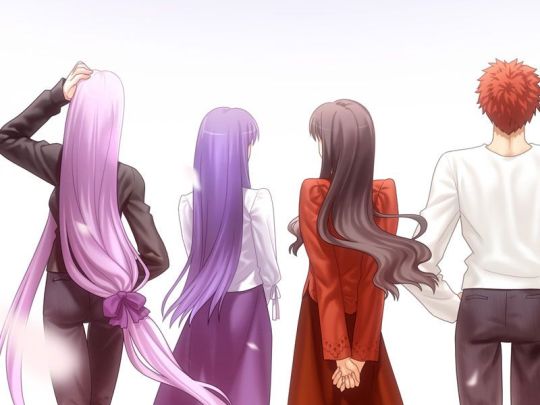
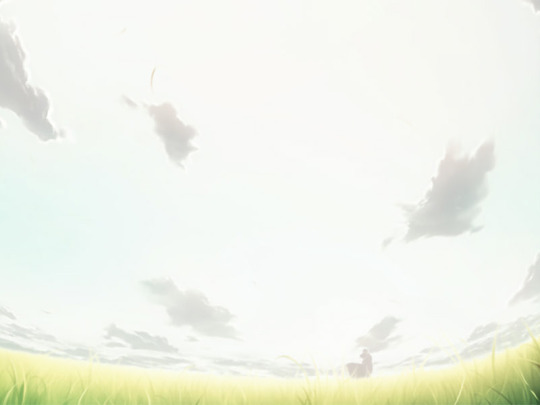
I’ll never get behind why some fans believe Shirou finds some sort of ~balance~ in Unlimited Blade Works route. If anything, I believe that’s the route he ditches his personal bonds for the sake of ideals. His relationship with Rin is shallow and he feels little about about outside sexual tension and lipservice to the tsundere fanboys. He never helps her to deal with her issues, he never knows her outside of a superficial cute one dimensional tsundere manner.
That’s ok tho. It’s purposeful their relationship was shallow and meaningless.
Because the actual focus of his relationship is with Archer, even Ilya and Taiga said Rin was quite irrelevant in that route, despite being the love interest. Archer wanted to make peace with his ideals. There’s a question brought up by him which applies to all the moral of the story: do you fight to protect an ideal or people? Those who fight to protect ideals only can never save people. Rescues can happen, but that’s not truly saving them.
That’s why Shirou never saves anyone in UBW, not really. He doesn’t. He can protect his ideal and he does the final word is Archer establishing he wasn’t wrong with this choice.
Heavens Feel is the opposite, saving people, a person he loves becomes the priority over saving and protecting an ideal, just like saving an ideal was the focus over people in the last route (the scene with Taiga in danger came to mind). Of course, one can protect an ideal by saving people, but what matters in the narrative is the end goal and not the means (in UBW, Shirou helping people isn’t his goal, but means to an end, his goal is an ideal). To no surprise, the focus of his attention is a lovely person he loves and cherishes: Sakura. To no surprise, he learned Kiritsugu failed to protect his loved ones and isn’t a superhero as he thought he would (while no such reflection happens in UBW). He saved Sakura and he saved Rin (unlike UBW). Rin needed this closure, needed Shirou to help them find the way to be sisters. He also saved Ilya who might have died, but did so without regrets. Saving someone doesn’t always mean saving their lives. So the partying shot there’s Shirou surrounded by his loved ones, his family, doing a mundane thing like watching the cherry blossoms.
Interestingly enough Sakura loves Shirou’s ideals and Rin criticizes them and finds them illogical and his way of life painful while Sakura’s the one mourning when he discarded them. Rin cries because Shirou tells her that sorry but that’s how he is.
The route he learns to balance (or should I say, the one he gets both with the same intensity) is the one I see accused of being the ‘pure ideal one’ by I think misjudge it (because superficially it seems that way, but no). It’s Fate. Because Shirou didn’t only focused on proving his ideals and maintaining them. He also focused on saving someone above everyone else, what he did not do in UBW. He loved and wanted Saber to be happy above everyone else. Saber had a double nature of girl he loves and a pile of unstained ideals and part of the conflict of the route is Shirou accepting this.
So once the game ends, and he comes to both answers: protecting your ideals is right as they are beautiful and saving people is what gives you happiness you ought to pursue one can unlock Last Episode. Last Episode with Shirou (and Saber) upholding his ideals while wishing to reward Saber and be with her, looking for her endlessly, he lived his ideals the fullest but placed her in equal importance to them. He becomes a timeless star like Saber and both are reunited to share the happiness as person together. Shirou managed to do both in Fate. The last shot is Avalon, the melting embrace of two stars who have fulfilled their duties as become people again.
Kiritsugu, on the other hand, failed both: he couldn’t protect his ideals and he couldn’t save the people he loved. He missed his chance when he was tragically young and keep making the wrong choices in the course of his life. Shirou exists to take the happiness or be the ideal he failed to follow. Or both.
My two cents.
107 notes
·
View notes
Photo
For the longest time, I've had several friends tell me about this Tumblr post about the romances in FSN that was supposedly exceptionally terrible that they begged me to address in some proper response on Tumblr itself. While the post itself ended up actually being worse than I had expected, being forced to stop reading at several points to laugh at loud at just how fucking ridiculous and wrong it was, I found the idea of making a Tumblr account specifically just so I could address a post from 2014 pretty stupid. Alas, I had to see it shared in several discussions on FSN recently and it's one of my buddies' birthday soon so I said, you know, fuck it.
Frankly, there's just so much wrong with this post that the biggest issue I have in writing all of this out is not knowing where to even start. However, when looking at essays like this it is always best to address the central issue with them and if this essay and its follow-up have a rotten heart that corrupt anything else it has to say it is that is simply does not understand Rin as a character. At all. I've never seen someone who thinks HF is where Rin shines best ever really understand her but this essay is especially egregious in this regard because it makes a lot of bold statements which are just fucking embarrassing and factually incorrect yet it does so with an air of confidence and straight up arrogance befitting of Rin herself.
If there's a thesis, a central thrust, behind my response here it's that there is a reason why people who consider Rin their favorite like her best in UBW and people who think HF Rin is the summit of the character don't actually even like her in the first place—it's because Rin gets most of her development in UBW, and her romance with Shirou is precisely what unveils the depths and nuances of her character to the greatest extent, far more than her relationship with Sakura does. Even in HF, the true depths of her character are revealed only when contrasting her with Shirou and by taking the whole of the VN (specifically her romance with Shirou in UBW). If I had to put it succinctly, people who like HF Rin best are like Shirou at the start of the story, only seeing Rin at the surface; but people who like her best in UBW can see her for who she really is and truly understand her.
You cannot really grasp Rin and the nuances of her character until you take into account her role as the deuteragonist of Fate/stay night. And this is a crucial role, as throughout the VN the story keeps weaving in these parallels between Rin and Shirou, parallels which are accompanied of course by contrasts which expose who these characters fundamentally are. These parallels aren't as obvious or in your face as the ones with Saber, Archer or Kirei because the story doesn't go out of its way to point them out to you but they are incredibly obvious upon retrospection. If I had to sum Rin's role in FSN and the core of how she is supposed to relate to Shirou, it is that Tohsaka Rin is a considerably healthier, more down-to-earth and well-adjusted (and arguably more realistic) female version of Shirou.
The way in which Rin is explored across the entire VN is the same as the way Shirou is. Fate lays down the foundations of the character; UBW explores them at their very core and the reasons for their being the way they are; HF presents them with a practical test of their convictions in the form of Sakura. And although Fate never really truly explores Rin beyond like one specific scene whose meaning and implications only become apparent when taking the rest of the VN into context (which I will come to back to later), both UBW and HF contrast Rin and Shirou by having them face the same fundamental character conflicts yet have the former confront them in a far healthier fashion than the latter.
UBW gets down to the very core of what defines both Rin and Shirou by asking us a very key question—why did either of them become who they are? Why does Shirou want to be a superhero? Why is Rin a mage? The superficial and obvious answer to this would be that both of them inherited a rather toxic legacy from their fathers both of whom were killed by Kirei (and in Shirou's case, guilt over the fire) but over the course of UBW we learn that things are more complicated than that. The struggle of the characters in UBW, the hurdle that they have to overcome, is the apparent contradiction between both of them pursuing this lifestyle that was supposedly forced upon by their fathers, and their own personal happiness and well-being. But as we learn, while there is a friction between those two things, there is no innate contradiction. In fact, both of them chose to pursue that lifestyle because it made them happy. The Fuyuki Fire had left Shirou unable to feel happy or have fun without feeling guilty about it. The only way he could feel any kind of joy was by finding happiness in other people's happiness. Shirou helps people because he wants to see people happy. He's not just attempting to atone for some "sin," he is also trying to find some kind of fulfillment in life the only real way he can. Meanwhile, Rin had always found magecraft fun; it's literally the reason Sakura got shipped off to the Makiris as Rin was deemed a more fitting heir to the Tohsaka name and magic crest.
What are, then, Shirou and Rin's character arcs in UBW? They are all about remembering this perhaps not forgotten but definitely surpressed fact. The reality is that Shirou can both be happy and be a superhero, as can Rin be both happy and a mage. All they have to do is realize that the path they chose for themselves is only good insofar as it makes them happy. The final scene of UBW in the classroom is in a way the perfect microcosm of Shirou's relationship with Rin and his new mindset—"most of all, I want to be with Tohsaka." Shirou hates the Magic Association since it conflicts with his ideals—nonetheless, Rin matters to him more than his ideals, since the new Shirou wants to be happy above all else and being with Rin makes him happier than being a seigi no mikata. And as the UBW poem puts it... "After traveling to distant exotic countries... You will return to where you belong, one sunny day." And as would FHA and the UBW anime epilogue later inform us, Rin is just as prepared to make compromises on her mage lifestyle if it meant being with Shirou.
Of course, the contrasts between Rin and Shirou in the way they come to their conclusions are quite striking. Striking in how easy it for Rin (relatively speaking) to arrive at the conclusion that she does (even if it does take her a bit more time to internalize that conclusion and ammend her outward behavior accordingly)—the key scene here being Shirou's defect on Day 10 of UBW. It's a wonderful scene—brilliant in its simplicity. It's a simple quiet scene where the characters simply talk about themselves and their issues and yet it's a pivotal scene for Rin. Prior to it, Rin is always trying to cast herself as pragmatic practical magus who is only allying herself with Shirou because that's what the practical, pragmatic thing to do is. But suddenly, Rin ends up opening herself up to Shirou about how she doesn't do things that aren't fun for her. Rin isn't allying herself with Shirou because that's what the reasonable thing to do in the context of the war would be, but because she legitimately enjoys his presence! She isn't a mage because that's what she's supposed to do, but because that's what she's has always wanted to do. Shirou isn't like this; he can't come to that conclusion on his own. He needs to see Rin crying to figure it out. He needs to see the girl that loves and cares about him, and that he has fallen for in turn, be concerned about his behaviour, and reprimand him for it, to reconsider what he is doing and the core reasons as to why he chose to adopt Kiritsugu's ideal for himself:
Tohsaka is seriously angry. [...] Yeah, that makes me happy. I finally realize now, because Tohsaka is that kind of person. [...] I always knew there was something wrong with the method, but I did not understand what. But it's so clear now.It's because of this person that is seriously angry for my sake.
We are shown that despite all the self-esteem issues Rin suffers from, she still fundamentally has self-worth, which Shirou completely lacks. It's why she can arrive at the conclusion she needs to lead a more happy and fulfulling life on her own while Shirou needs help from someone like her.
Now before getting into HF, and how specifically that route and that route alone tackles the differences between Rin and Shirou, it is worth going over two important questions which are explored not only in UBW but the entire VN as a whole: Why does Shirou love Rin? And why does Rin love Shirou?
Turns out you can't really tackle this question separately because Shirou loves Rin for the same reason that she loves him—they both (correctly) view the other as an unstoppable force of nature, someone with an unbreakable will who never quits no matter how dire the circumstances may seem. And here we have to address one of the fundamental aspects of both Rin's character and her romance with Shirou—the contradiction between Rin's view of herself and Shirou's view of Rin. We start by reading what Shirou has to say about Rin upon learning that she has no intention of dropping out of the Grail War despite losing Archer the day after the fight with Berserker in the Fate route:
I'm stunned. …No, I'm not surprised. I already knew Tohsaka was this kind of a person. She is really firm, and amazingly selfish, and so fascinatingly brilliant. [...] In other words, this is it. It feels like ages ago, but the Tohsaka Rin that Emiya Shirou admired was a girl like this. That's why I'm happy. Tohsaka has to be like this. After all, I wouldn't know what to believe in if such a stubborn girl decided to give up.
But this is seemingly contradicted by what Tohsaka has to say about herself in HF, as she recalls what made Shirou's attempts to keep trying to jump over that pole despite it obviously being impossible for him:
["]I've always been like that. I determine whether or not something is possible. If I know it's impossible for me, I quickly give up. I don't try what I can't do, and I never regret it or think I'm powerless because of it. I'm cold like that. I'm a terrible person. Kirei called it machine-like instead of cruel."
But Tohsaka isn't belittling herself. She's proud of how she is.
"But I do sometimes think how pure it'd be to just keep trying without a thought for whether it's possible. …Well, as a child, it's shocking to see someone that's completely the opposite of you, right? That's why it was traumatic. That guy who foolishly kept running was…"
Someone I was happy to know existed. Tohsaka murmurs with a dreamy expression.
Yet as Kirei informs us in UBW as he is about kill Rin and turn her into a vessel for the Grail: "You're right. You never give up until the very last second, Rin. At the very same time, you have this wonderful side of you that admits reality. Yes. This contradiction is very mellow." Rin is one or the other, she is both. She is the idealized Rin that never quits who Shirou sees and also overly realistic and inhuman machine-like Tohsaka that Rin herself sees in the mirror. But a huge part of UBW is that there is something worthwhile and valuable in seeking to accomplish some ideal that you know is unachievable and impossible, and this theme plays a huge role in Shirou's romance with Rin.
Shirou has always had an idealized image of Rin in his head, one that slowly comes to crack as he finally meets her. Leaving aside how Shirou reacts to Rin's superficial traits like her crankiness, sharp tongue, irritableness, etc. what Shirou is most shocked to learn is that this girl he had always regarded as the female version of himself, that he had admired for being as much of a stubborn unflinching mule as himself had all this time been beset by doubts and insecurities. He notices her trembling at the school at the sight of the horrors unleashed by Shinji's Bloodfort. He perfectly understands what she is going through when Archer betrays her:
———She does not look away. She should break down at a time like this, but she keeps a straight face and endures it, gritting her teeth. [...] I know that figure. The red classroom. She tried to hide her trembling legs and act like the same old Tohsaka Rin, even with the collapsed students in front of her. …That's her strength and weakness. She tries to act firm in any situation, so everybody around her gets the wrong idea that she's a strong person———
But Shirou doesn't abandon his idealized view of Tohsaka Rin from school. If anything he starts to idealize her even more. The fact that Rin is held back by so many traumas and insecurities, that she is actually rather weak and unsure of herself, makes the fact that she succeeds in being as amazing as she is nonetheless makes her more amazing, not less:
But that's what saved me. She's softhearted, but a realist, with a strong heart that casts away her own weakness. ...She bottles her doubts and pain inside of her and moves forward magnificently, enough to dazzle those around her.
He can see how Rin constantly belittles herself and decides to help her out because Shirou wants nothing more than to help Rin be the amazing smart and fierce girl that he knows deep down she can be despite how she herself doesn't think she can. Just like Rin wants Shirou to learn how to love himself, so does Shirou just want Rin to see the Rin that he sees, for her to see the Rin in the reflection of his eye, and the consumation of this dynamic can be found in the confession scene where Shirou encourages Rin to get back on her feet and be the best she can be, because even though she will inevitably stumble once again he will again be there to help her out as there is no greater pleasure for Shirou than knowing that he was able to help Tohsaka Rin:
The process. If you walk down the path that you believe is right, you cannot be wrong. …At a time like this, most people will realize that their path is a wrong one, but she's different. Her path should always be one that she can be proud of.
"———Yeah to be honest, you've always shined. …I won't regret my actions either. I believe what I've done is right, but it's full of stitches."
...and that is why Rin loves Shirou. He had always supported her and encouraged her to be the best she can be, even when he didn't know it. His example had always been a source of hope and strength for her, an ideal for her to strive towards and force her to improve herself no matter. Shirou had always brought out the best in Rin, even when he was just a crush for her she couldn't remember the face of. Like she says to Archer: "...Heh, I know without being told that Shirou's soft. [...] But I love that soft part of him. He should be like that. I'm saved by having a guy like him."
And this is why Rin is saved in UBW, not in HF—even though she's perfectly capable of saving herself. In HF, she only ends up happy since her sister is happy. In UBW, she ends up happy because a very wonderful boy is going to be there by her side to help her work out all of her issues, even though he himself notes during their sex scene in HA that Rin herself would be able to do that all on her own.
HF Rin behaves the way that she does because she isn't in a romantic relationship with Shirou, and thus defaults to being what is expected of her rather than try to be the Tohsaka Rin that she wants to be and Shirou would want her to be. He doesn't understand Rin anywhere near as much nor does he care as much as he does in UBW so Rin is once again forced to figure all of her issues out on her own. When faced with the reality that it's virtually impossible to save Sakura, Shirou continues to try whereas Rin is constantly steeling herself for when the time to kill her finally comes. (So much for Shirou "saving" Rin in HF, eh? Like his efforts to reconnect the two sisters ever amounted to shit lmao.)
But once again, the focus is more on how much healthier Rin is mentally than Shirou. After all, Rin continues being a mage after the events of HF whereas Shirou ceases attempting to become a seigi no mikata. This contrast between Rin and Shirou helps show us just how warped the latter truly is. Because Shirou does not experience the events of UBW and because he does not undergo the character arc that he did as a result of those events, he does not come to the realization that he chose to pursue Kiritsugu's dream because helping people made him personally happy. As such, he does not realize that there is no innate contradiction as such between his own happiness and the pursuit of his ideal. After all, there is no reason why Shirou couldn't keep on being a superhero after choosing to save Sakura, or why he shouldn't be able to form relationships with other people in the Mind of Steel ending. Nonetheless, the story contrives a way to have Shirou be forced to kill Rin and Illya, his two deepest connections in HF outside of Sakura to send us a message—Emiya Shirou doesn't do compromises. Once he chooses to step aside his path of becoming a seigi no mikata, it's as if he has betrayed it for all time; once he chooses to abandon one relationship that brings him happiness, he has foresaken all others for all time as well. Rin isn't like that of course so even in a route where she doesn't get to the very core of conundrum she still succeeds at finding some kind of resolution where she finds a balance between both paths.
I think it should become fairly obvious by now just how much bullshit there is in the essays above. Sakura loves Shirou's ideal but Rin doesn't? This despite the fact the story focuses far more on how much Rin loves Shirou for his unbreakable will, how much strength she draws from him and how she decides to support him in his journey to come as close to possible of achieving Kiritsugu's ideal precisely because of that than it ever does with Sakura? UBW doesn't focus on Rin? This despite the fact none of the routes really focus on the heroine, each being primarily a catalyst for character development for Shirou and a means to explore his depth and nuance? The relationship between Rin and Shirou is only based on sexual attraction? Rin's last thoughts before she dies "being about Sakura" somehow prove Rin recieves all her character development in HF? This despite the fact that this is what she thinks to herself as she thinks Kirei is about to order Lancer to kill her?:
Except for one thing. She imagines that boy's expression when he finds her dead after coming to save her. She doesn't want him to cry. It angers her that she's the cause of his tears, and she doesn't know how she can apologize to him.
Frankly the essays above spew so much nonsense that it is baffling. Furthermore, I cannot even say that the nonsense is result of stupidity but intellectual dishonesty. To say that Rin wants Shirou to abandon his ideal when she developed a crush on him over the same event as Sakura just tells me that author has some personal hatchet against Rin, and thus seeks to undermine her character and her romance through malicious methods, deliberately and willfully ignoring multiple scenes which go against everything they have to say. And judging by that comment about "tsundere lovers"... I think I can guess why.
Interestingly enough almost all of the criticisms tossed at Rin and her romance... apply more to Sakura. If there's a shallow romance where the lovers hardly understand each other based mostly on sexual attraction, where the heroine receives most of her character development thanks to her relationship with one of the other heroines who is also her sister, where the main character doesn't save the heroine, it's the one in HF.
Nothing illustrates this better than the scene on Day 11 of HF where Shirou helps Sakura go to sleep. At one point Sakura starts talking about how she feels jealous and perhaps even resentful of her sister... and Shirou completely ignores all of it because he's too busy daydreaming about how much he would like to have sex with her right then and there. LOL. LMAO even. Despite the fact that the romances in Fate and UBW are wholly based around the two lovers in each respectively getting to peer into each others' souls and coming to understand each other perfectly, Sakura and Shirou never truly get to know each other. Sakura never learns about the fire, and Shirou never truly learns about the resentment she feels towards everyone especially her own sister and that she keeps hidden deep beneath the surface. These are both central traits for each of these characters yet neither ever truly helps the other resolve them. Ultimately the person who saves Sakura in HF is Rin. It is she who by choosing to spare Sakura and open herself up to her at the last moment that allows her to escape Angra Mainyu's control, and thereby allow Shirou to free her using Rule Breaker. It is Rin who helps Sakura overcome her Shadow, not Shirou. We don't even know if he even understands if Sakura's unconscious resentment of the rest of the world is what allows Angra Mainyu to manifest outside of the Grail after Kirei and Zouken explain it to him.
Everything to do with the high jump scene really shows just how poorly written the romance with Sakura is in comparison to Rin's, really. Just ask yourself the following question: Why is the high jump the reason Sakura fell for Shirou? I'm not asking from the perspective of the character herself, it's pretty obvious why someone like Sakura going through what she was found that scenery so inspiring. I mean in the sense—what exactly does this contribute to the romance? How exactly does it help the romance become any deeper? Because despite how important as previously explained the high jump is to Rin's character and her romance with Shirou, this aspect of Sakura's romance with Shirou is never properly explored or given the attention it deserves. Following up a route where the heroine falls in love with an MC because of his unconquerable will and thus chooses to support him as he begins his nigh-impossible quest of becoming a seigi no mikata with one where a heroine who falls in love with the MC for the same reason but is forced to see him be compelled to forsake his ideal due to factors outside either of their control for her sake... is an interesting concept. Too bad Nasu doesn't ever do anything with it. This aspect is only ever really brought in like several scenes and that's about it. It never truly gets explored because the focus is elsewhere.
That's truly the biggest issue in HF—despite how central the romance between Shirou and Sakura is for the motivations for all the characters, the romance itself gets piss poor development as it is sandwiched between other subplots like Shirou's relationship with Illya, his personal conflict with Kirei, and the relationship between Rin and Sakura. It is routinely undermined by its clashes with the relationship between the two sisters. Because Nasu has to keep sneaking in all these indications that Shirou is still kind of into Rin and gets along with her excellently, it becomes exceedingly hard to truly take the romance between him and Sakura seriously. Shirou completely forgets he was supposed to have lunch with Sakura on Day 7 to strategize with Rin and then completely misses how this might make the former envious of the latter. He leaves her sick at home on Day 9 to again meet up with Rin on the same day Nasu expects me to take his idea that Shirou loves Sakura so much he would completely give up his ideal for her. Despite how much Nasu may say the romance in HF was his personal favorite, it never really feels like he cared much about it. The difference in the quality of the writing between the romance and the rest of HF is hilariously and embarrassingly massive.
So again, I ask—Why is the high jump the reason Sakura fell for Shirou? Because that's the reason Rin fell for Shirou and that aspect of the romance exists for no other reason than to be the final straw that finally brings the two sisters at each other's throats. That's it.
But oh I guess we'll have several cringeworthy scenes with overly dramatic music which are incredibly forced and silly so the romance is a masterpiece.
As for the whole point about how supposedly Last Episode shows how the Fate route is in fact the synthesis between Shirou's conclusion in UBW and HF respectively—I'm sorry but frankly that is self-evidently ridiculous. Last Episode was written for the Realta Nua version of the game, and exists as fanservice for fans of Saber who wanted to see the two lovers reunited and to assure them Shirou won't become Archer in that route. It's placed at the end because that's where the fanservice would hit the hardest. And I'm perfectly fine with that since I like the romance with Saber and it's good fanservice. A ton of people would say it contradicts the themes of Fate but I don't think that's the case. But to say it was somehow intended to completely alter the intended structure where the VN's themes culminate in HF is just wrong. Not to mention I already disproved this silly notion that Shirou doesn't care about Rin or that he puts his ideal before her.
In conclusion—Rin is great. Shirou is great. Rin and Shirou together are great. I love seeing them happy.



I’ll never get behind why some fans believe Shirou finds some sort of ~balance~ in Unlimited Blade Works route. If anything, I believe that’s the route he ditches his personal bonds for the sake of ideals. His relationship with Rin is shallow and he feels little about about outside sexual tension and lipservice to the tsundere fanboys. He never helps her to deal with her issues, he never knows her outside of a superficial cute one dimensional tsundere manner.
That’s ok tho. It’s purposeful their relationship was shallow and meaningless.
Because the actual focus of his relationship is with Archer, even Ilya and Taiga said Rin was quite irrelevant in that route, despite being the love interest. Archer wanted to make peace with his ideals. There’s a question brought up by him which applies to all the moral of the story: do you fight to protect an ideal or people? Those who fight to protect ideals only can never save people. Rescues can happen, but that’s not truly saving them.
That’s why Shirou never saves anyone in UBW, not really. He doesn’t. He can protect his ideal and he does the final word is Archer establishing he wasn’t wrong with this choice.
Heavens Feel is the opposite, saving people, a person he loves becomes the priority over saving and protecting an ideal, just like saving an ideal was the focus over people in the last route (the scene with Taiga in danger came to mind). Of course, one can protect an ideal by saving people, but what matters in the narrative is the end goal and not the means (in UBW, Shirou helping people isn’t his goal, but means to an end, his goal is an ideal). To no surprise, the focus of his attention is a lovely person he loves and cherishes: Sakura. To no surprise, he learned Kiritsugu failed to protect his loved ones and isn’t a superhero as he thought he would (while no such reflection happens in UBW). He saved Sakura and he saved Rin (unlike UBW). Rin needed this closure, needed Shirou to help them find the way to be sisters. He also saved Ilya who might have died, but did so without regrets. Saving someone doesn’t always mean saving their lives. So the partying shot there’s Shirou surrounded by his loved ones, his family, doing a mundane thing like watching the cherry blossoms.
Interestingly enough Sakura loves Shirou’s ideals and Rin criticizes them and finds them illogical and his way of life painful while Sakura’s the one mourning when he discarded them. Rin cries because Shirou tells her that sorry but that’s how he is.
The route he learns to balance (or should I say, the one he gets both with the same intensity) is the one I see accused of being the ‘pure ideal one’ by I think misjudge it (because superficially it seems that way, but no). It’s Fate. Because Shirou didn’t only focused on proving his ideals and maintaining them. He also focused on saving someone above everyone else, what he did not do in UBW. He loved and wanted Saber to be happy above everyone else. Saber had a double nature of girl he loves and a pile of unstained ideals and part of the conflict of the route is Shirou accepting this.
So once the game ends, and he comes to both answers: protecting your ideals is right as they are beautiful and saving people is what gives you happiness you ought to pursue one can unlock Last Episode. Last Episode with Shirou (and Saber) upholding his ideals while wishing to reward Saber and be with her, looking for her endlessly, he lived his ideals the fullest but placed her in equal importance to them. He becomes a timeless star like Saber and both are reunited to share the happiness as person together. Shirou managed to do both in Fate. The last shot is Avalon, the melting embrace of two stars who have fulfilled their duties as become people again.
Kiritsugu, on the other hand, failed both: he couldn’t protect his ideals and he couldn’t save the people he loved. He missed his chance when he was tragically young and keep making the wrong choices in the course of his life. Shirou exists to take the happiness or be the ideal he failed to follow. Or both.
My two cents.
107 notes
·
View notes